Articles & Resources
Assignment of agreement of purchase and sale.
An Assignment of an Agreement of Purchase and Sale is when an original purchaser under an Agreement of Purchase and Sale permits a different party to take over the contract. New homes, condominiums and even re-sale properties can be assigned.
Purchasers usually assign their Agreement of Purchase and Sale with the view of making a profit.
For example, if the original purchaser signed the Agreement of Purchase and Sale at $100,000.00 but they are now transferring the contract to the third party for $150,000.00 they have profited $50,000.00.
Other reasons?
- Keep in mind, when a purchaser signs the contract, closing may not take place for another year or longer;
- They no longer want the home (i.e. they’ve found something better);
Does this mean that the original purchaser walks away free after the Assignment Agreement has been signed? No.
Most, if not all, Assignment agreements will have a clause to the effect of “(original) buyer assumes continuing liability for the “covenants, agreements and obligations” contained the original agreement”
What is the benefit to the new buyer?
- The new buyer may be able to buy into a desirable neighborhood at a time when there are no more units available to be purchased directly from the builder;
- Even taking the original buyer’s profit into account, the assignment may give the new buyer a price advantage over other properties that are currently on the market; and
- Depending on the timing of the assignment, the new buyer may be positioned to choose finishes and make minor changes to the yet-to-be-built home.
Common Terms
Assignor: Original Buyer
Assignee: New Buyer
Vendor: Builder
Consent: Permission from the Builder to transfer the contract to the Assignee. Absolutely Necessary.
Can an Agreement of Purchase and Sale be assigned?
Most Agreement of Purchase and Sales state that the Agreement of Purchase and Sale cannot be assigned without the Vendor’s consent which may be withheld arbitrarily. What this means is that the Builder has the ability to deny any requests for assigning the APS at its sole discretion.
However, at times, the Assignor may have already signed an Amendment to the Agreement of Purchase and Sale permitting one Assignment of the APS. In these circumstances, there may be little to no barrier in assigning the APS. In any event, reference will still need to be made to the APS to make sure that there are no conditions to an assignment [i.e. 90% of units have to be sold (if condo) before an Assignment will be permitted].
Responsibility to Obtain Consent:
Clause 15 in the Assignment of Agreement of Purchase and Sale sets out that the responsibility to obtain consent remains with the Assignor and all costs are to be paid for by him/her. However, costs can be split by modifying Schedule A.
“ The Assignee acknowledges and agrees that the Developer’s Agreement contains a provision prohibiting the purchase and the sale of the within unit without the Developer’s consent and accordingly the Assignee and Assignor shall execute and deliver to the Developer Consent documents as required. This Agreement of Purchase and Sale shall be conditional upon the Assignor obtaining the written consent of the Developer to the assignment herein until XYZ date, failing which the Agreement herein shall be null and void and all deposits returned to the Assignee, unless otherwise extended in writing by the Assignee and Assignor ”
Note: While there will be an Assignment of Agreement of Purchase and Sale to be executed between the Assignor and Assignee, the Vendor will also draft their own consent to assign which will contain their terms and conditions.
Adjustments
Who is responsible for paying additional costs arising in the Statement of Adjustments? Very important to advise client accordingly depending on if Assignor or Assignee.
If we are acting for an Assignor, we want to make sure that there are no clauses in Schedule A or any other Schedule which makes them responsible for adjustments.
Keep in mind, we will not know what the actual adjustments are until well after the Assignment Agreement has been signed. At times, these costs can be significant (i.e. increase in development charges).
At all times, it is the responsibility of the Assignor and Assignee to be diligent in ensuring that they are aware of what’s being contracted for.
Please note the content on this web site is provided for general information purposes only and does not constitute legal or other professional advice of any kind.
Nava Wilson LLP specializes in Real Estate, Immigration, Corporate Law, Litigation, and Wills and Estates.
- 10 Milner Business Court, Suite 210 Toronto, ON, M1B 3C6
- (416) 321-1100
- [email protected]
- Real Estate Law
- Immigration Law
- Corporate Law
- Wills and Estates
- Retainer Policy
- Terms of Use
- Privacy policy
- Know your client
- (416) 321-1107
Automated page speed optimizations for fast site performance

Assignment of Purchase Agreement
An assignment of purchase agreement and sale is when a buyer of a new home sells a third party the right to assume the purchase contract. 3 min read updated on September 19, 2022
An assignment of purchase agreement and sale is when a buyer of a new home sells a third party the right to assume the purchase contract. In this situation, the buyer is the assignor, and the third party is the assignee. Under the agreement, the assignee pays a higher price. This agreement must take place in the time between when the assignor agrees to buy the home, but before the contract closes with the builder.
With this period, the assignor never takes the title of the property. Instead, the title is put in the name of the assignee. This is informally known as "flipping a home." The flipping of a home occurs when:
- The original buyer enters into a purchase contract and assigns the contract to the third party before closing ends.
- The original buyer makes a profit from the sale.
If the sale does not close, the seller will lose time, money, and resources.
Advantages and Disadvantages of an Assignment of Contract
There are several advantages of an assignment of contract. With an assignment of contract, you are not actually flipping a home. Instead, you are flipping the contract, which means you don't have to have the financial backing to purchase the property. Not only do you not close on the property, but you will also not have to pay any closing costs or take on any additional expenses.
For wholesale flippers, using the assignment of contract is a way to save thousands of dollars each month. For example, if the closing costs per property are $1,000, and you "flip" 10 properties, that is a $10,000 savings.
Wholesalers only need to put down the purchase contract deposit amount that will be held in escrow with the title company or with an attorney. The lower the deposit, the lower the risk that will be assessed. Deposits may be as low as $10 or $100 and will be easier to lose if there are any delays or issues.
An assignment of purchase agreement allows the assignee to buy into new and desirable neighborhoods that are no longer available through the builder.
The main disadvantage of an assignment of contract is the risk of not finding a buyer. If a third-party buyer is not found, and you are under contract, you are responsible for completing the contract. Additional responsibilities include the responsibility of:
- Existing liens.
- Property taxes.
In addition, if the financing of the assignee cannot be obtained before the closing, this may cause the assignor to be responsible for the closing costs and the purchase of the property. The assignor may also not be able to get his or her deposits returned.
Obtaining the Builder's Consent
For an assignment of a purchase agreement to be valid, the builder and assignor must first have a valid legal contract in place that shows the assignor is obligated to purchase a home or condominium unit from the builder.
The buyer may limit how the property can be sold, including that the property cannot be listed on the MLS (multiple listings service). If it is, it is seen as a competing with the builder. If the assignor puts the property on the MLS, it will be a breach of contract, and the builder will be entitled to damages or rescission of the contract. The buyer will also be able to retain any deposits that have been paid and any other money paid for upgrades and extras.
The assignor must also clearly state the property is an assignment of an agreement of purchase with the builder and not a direct sale from the assignor.
Preparing an Assignment of Purchase Agreement
When preparing the agreement documentation, there are questions that should be asked to determine responsibility. Some of the questions to be asked are:
- Who will be preparing the documents?
- Who will pay the cost to prepare the documents?
- Will the assignment agreement and written consent of the builder be prepared by the builder's attorney? And will they cover the costs?
- Can terms agreed to by the assignor and builder be negotiated by the assignee? If so, who will cover the costs, and how will they be resolved?
A detail that should also be negotiated is the responsibility of paying the commission of the assignment agreement.
If you need help with an assignment of a purchase agreement, you can post your legal need on UpCounsel's marketplace. UpCounsel accepts only the top 5 percent of lawyers to its site. Lawyers on UpCounsel come from law schools such as Harvard Law and Yale Law and average 14 years of legal experience, including work with or on behalf of companies like Google, Menlo Ventures, and Airbnb.
Hire the top business lawyers and save up to 60% on legal fees
Content Approved by UpCounsel
- Assignor Definition
- What Is the Definition of Assigns
- Assignment of Rights Example
- Assignment Of Contracts
- Assignment of Rights and Obligations Under a Contract
- Assignment Agreement Definition
- Partial Assignment of Contract
- Assignment Law
- Legal Assignment
- Assignment Contract Law
- Purchase Agreements
Real Estate Purchase Agreements
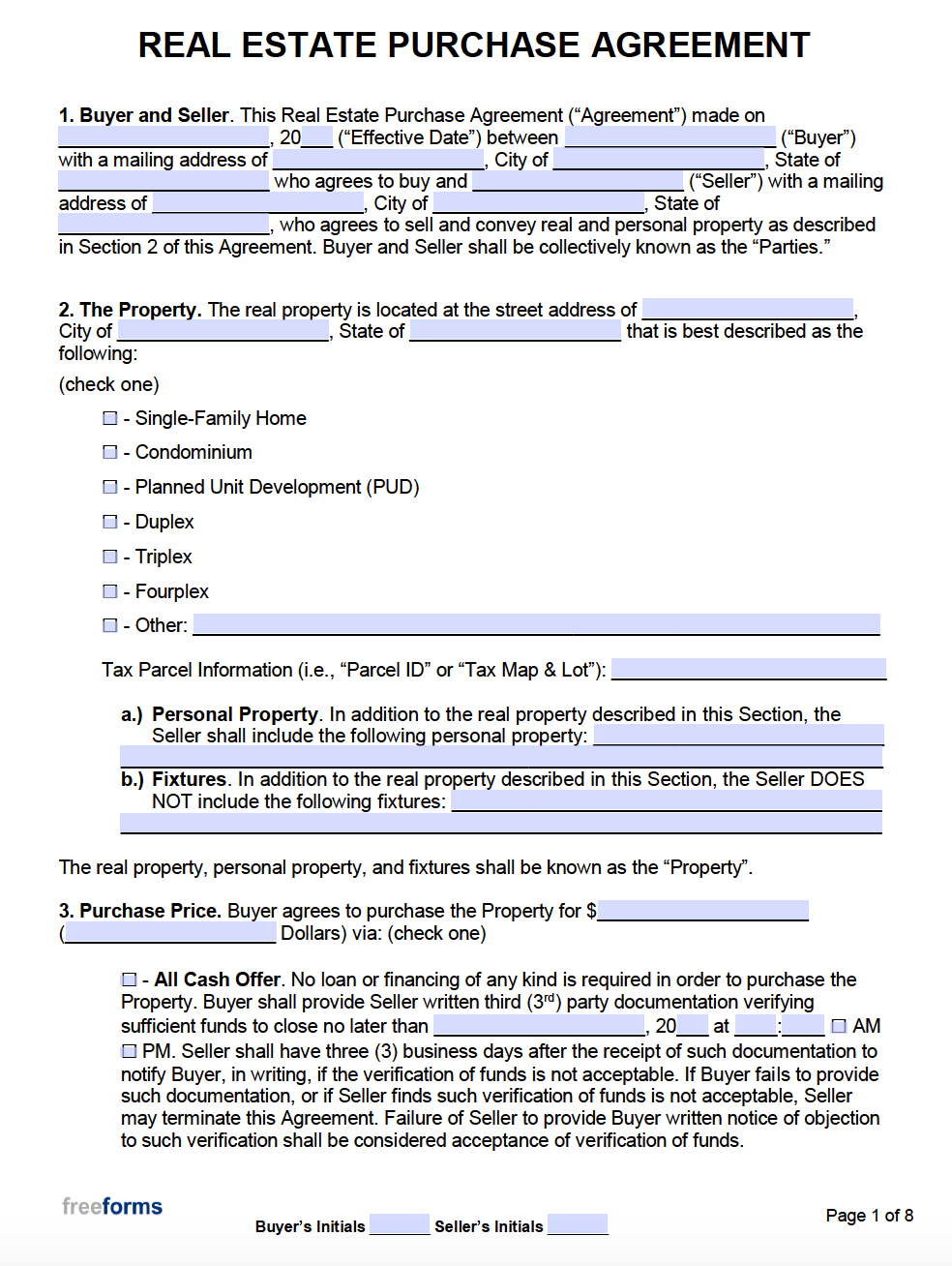
Purchase agreements are most commonly used for creating a transaction between a buyer and a seller of residential real estate. The purchase agreement will outline the final negotiations between the parties including the sales price, contingencies, and when the closing must occur. In most transactions, the agreement will be dependent on the buyer obtaining financing from a local financial institution, therefore, it’s recommended that the seller not agree to any sales contract unless the buyer is preapproved or prequalified for the loan.
- Connecticut
- Massachusetts
- Mississippi
- New Hampshire
- North Carolina
- North Dakota
- Pennsylvania
- Rhode Island
- South Carolina
- South Dakota
- West Virginia
What is a Real Estate Purchase Agreement?
A real estate purchase agreement is an instrument that is employed when individuals partake in the purchase & sale of a residential dwelling. This can be applicable to a single-family house, condo (or another type of common-interest community property), duplex, etc. Once a buyer shows interest in a residence for sale, they will submit an offer in the form of this agreement. Listed within the content of the agreement is the prospective buyer’s desired contractual terms, such as their proposed purchase price, provisional requests, protective contingencies, and the amount of earnest money they are willing to deposit. The seller will typically be given a time limit to either accept, deny or counteroffer the submission. If accepted, the seller shall sign the offer creating a binding purchase agreement that will start the process of transferring the property. Otherwise, they may counter with an alternative proposition that includes the terms that they are more comfortable with (also using this very agreement).
Can a Seller Back Out of a Purchase Agreement?
Once a purchase agreement for the sale of residential property has been signed and is in escrow, participants are legally bound to uphold the commitments registered within the form. If the seller has a change of heart and would like to back out of the agreement, they may have some options to do so:
- While the Contract is Under Review – A lot of times after an agreement has been signed, it will be held under a five (5) day reviewing period where attornies can comb through the contract for verification purposes. The seller has the right to terminate the agreement at any time within the duration of this process.
- Back Out Addendum – If the seller included an addendum within the purchase agreement that allows them to back out at any time during the course of the contract, they may do so without any repercussions of the law. Most buyers will not agree to include this addendum within the content of the purchase agreement.
- Breach of Contract – When formulating the sales document, both parties will typically record certain contingencies that allow them to terminate the contract if they are not met prior to closing.
- Put in a Request to the Buyer – If all else fails, contact the purchasing party explaining the reasons why you would like to terminate the agreement. You never know, a buyer could have compassion for your situation and agree to void the contract. It never hurts to ask.
If the seller is unable to lawfully withdraw from the contract and still refuses to continue with the sale, they can face legal consequences and be held liable to compensate the buyer for an array of damages.
What are the Common Contingencies in a Purchase Agreement?
A contingency is essentially a clause within the contract that stipulates that if a certain requirement is not met, then the contract is void or open to further negotiations. These contingencies can be directly inserted within the content of the purchase agreement or attached to the contract in the form of an addendum. When creating your purchase agreement/offer, it is important to include any contingencies that will provide security for the transaction. Listed below are some of the more customary contingencies that buyers/sellers will want to include within the purchase agreement:
- Appraisal – Required by most banks, this clause states that an appraisal must be conducted before the transfer of property can occur. If the estimated value of the home is lower than the agreed-upon sales price, then the buyer must either terminate the contract, renegotiate the purchase price, or switch lenders in order to receive a second opinion.
- Financing – The contract may be terminated if the purchaser is unable to secure financing from a lender.
- Home Sale – The sale is contingent upon the buyer being able to sell their home by a specific date in order to continue with the purchasing of the seller’s property. (Sellers may be reluctant to accept this contingency and are usually more prone to accept offers that do not include this.)
- Homeowners Insurance – Insurance companies will sometimes refuse to provide coverage to high-risk properties that are located within certain regions of the country (flood zones, wildfire zones, earthquake fault zones, etc.). This contingency allows purchasers to back out of the agreement if they are unable to insure the property.
- Inspection – This type of contingency mandates that after entering into an agreement for the sale of a home, the buyer will have a certain period of time to have a professional perform a property inspection. If the inspection report indicates that there is a significant material defect contained within the property, the buyer has the right to cancel the agreement or propose a new deal with the seller.
- Kick-Out Clause – A compromise for the above-mentioned home sale contingency, this grants the seller the authority to proceed with the marketing of their property while under contract with the buyer. If the seller finds another buyer who does not require that they sell their home first in order to purchase the seller’s, they can then end the current sales contract and move forward with the new buyer who doesn’t implement the home sale contingency.
- Title – This requests that the seller provide confirmation that the property’s title is free and clear of any liens or encumbrances before finalizing the transaction. It also stipulates that the buyer has the right to review all documentation concerning the property’s title before the closing date. If an issue with the title arises, they will have the option of terminating the purchase agreement.
What is an Addendum?
An addendum is an additional form that can be attached to the purchase agreement. It can provide supplementary terms to the contract that either alter the course of the previously arranged agreement or simply just add to it at the time of its inception. As mentioned in the previous section, a contingency can come in the form of an addendum. Here are several different types of addendums that can be implemented, some of which incorporate the common contingencies listed above:
- Closing Date Extension Addendum
- Condominium Association Addendum
- Earnest Money Receipt
- Earnest Money Release
- Escrow Holdback Agreement Addendum
- Estoppel Certificate Addendum
- Inspection Contingency Addendum
- Owner (Seller) Financing Addendum
- Short Sale Addendum
- Termination Letter to Purchase Agreement
- Third (3rd) Party Financing Addendum
What is a Realtor?
A lot of people use the terms “Realtor” and “real estate agent” interchangeably and do not realize that they are not technically the same. Read the descriptions below to better understand the key differences between the two.
Real Estate Agent vs. Realtor
A real estate agent is an individual who has completed the required salesperson course for their state (this course will vary in the number of hours needed to pass depending on the state). After passing the course, they are instructed to take the mandatory state exam in order to demonstrate that they have sufficient knowledge of the local real estate laws and protocol. They must then join an agency that is overseen by a broker in order to legally serve clients who seek assistance with their selling or purchasing needs.
A Realtor is someone who has fulfilled all the requirements needed to become a licensed real estate agent and is also affiliated with the National Association of REALTORS® . Becoming a member of this organization means that you are held to a higher standard than your average salesperson, as you have to follow a certain code of ethics that is enforced by the association. In short, it is an extra credential that further legitimizes the agent and grants them access to the group’s various resources that can help facilitate a sale.
How to Find a Listing Agent
As most homeowners looking to sell their property are busy with their careers, families, and other obligations, they do not have the time nor the experience/knowledge to sell their own property by themselves. Luckily, there are agents who specialize in the sale of residential real estate who can help ease the process and maximize your final proceeds. A listing agent can perform the following tasks:
- Pricing the Home
- Advertising the Property
- Coordinate Showings
- Negotiating & Accepting Offers
- Managing the Essential Paperwork
- Preparing the Necessary Disclosures
But you can’t just hire anybody who has a license, you are going to want to recruit an agent who is qualified and has valuable knowledge of the area your property is located in. This means that you should avoid hiring someone who just recently acquired their license because they are a friend or family member. Begin the process by:
Researching Local Agents – Find out who the available agents are in your area by:
- Asking your friends, family, and co-workers if they know of any agents that they could recommend for hire.
- Driving around the neighborhood and taking note of any agents who are prominently displayed on the various “for sale” signs along the road.
- Attending open houses of similar properties to network with the agents showing the homes.
- Coldwell Banker
- Keller Williams Realty
Reviewing Their Record – When deciding whether or not you are going to sign with an agent, make sure that you first check their credentials. Try to verify the following info:
- How long have they been actively selling real estate?
- Are they doing it full-time or part-time?
- How many homes have they sold in the past year?
- Are they receiving top market prices?
- Do they sell within an efficient time frame?
- Are they proficient in selling homes within your neighborhood?
- Do they belong to a respected agency?
It is suggested that you interview a minimum of three (3) agents prior to entering into a listing agreement. Be cautious of hiring an agent who gives you a significantly higher estimate for the value of your home than other agents you’ve interviewed, they may just be trying to entice you to list with them.
Real Estate Agent vs. FSBO
“ For Sale by Owner “, or FSBO, is the act of selling a residential property without the assistance of a realtor/real estate agent. Although the majority of home sellers enlist the help of a real estate agent, that does not mean selling a home on your own is an inconceivable task. It does, however, require a lot more time, research, and work for the seller (marketing your home can be a full-time job). When considering the idea of selling your property on your own versus with an agent, you should first assess the pros & cons associated with both approaches:
Benefits of selling your own property :
- Not having to pay a listing agent’s commission (which can usually range from 4-7% of the sales price depending on the agent’s reputation and location of the sale).
- Determining your own asking price.
- Having full control of all advertising, showings, and negotiations.
- Buyers may underestimate your ability to sell the home accordingly, thus giving you the upper hand when being approached.
Disadvantages of selling your own property :
- Lack of expertise in the local market.
- Amount of time that will be taken away from your personal and professional life.
- Liability to follow the state’s real estate laws and provide the required disclosures.
- Handling all the necessary paperwork and approving the buyer.
- If the buyer has an agent, you will still have to pay their portion of the commission (typically 3% of the sales price).
- On average, FSBO properties tend to get less money than properties listed with real estate agents.
How to Sell Real Estate on Your Own
For the majority of the United States population, their home is their biggest asset. When a homeowner decides that they would like to sell their property, it can seem like a very intimidating task. Owners want to make sure they get top dollar for their property and hopefully even make a profit. So, it is important that before you put your dwelling on the market, you really reflect on whether or not you are truly ready to sell.
Whether you’re looking to sell your property because you would like to upgrade, downgrade, or relocate, this guide can help you take the necessary steps to sell your home without the assistance of a listing agent.
Step 1 – Prepping Your Home for the Marketplace

When preparing to sell your home, it is important to ensure that the property is presentable for public viewing. Here are some various ways you can make your property look more appealing to prospective buyers:
Administer a Deep-Cleaning – The first step should involve you making sure that the interior of the home is immaculate. This can be achieved by:
- Removing any unwanted clutter.
- Wiping down all the surfaces.
- Washing the windows.
- Vacuuming and mopping the floors.
- Shampooing carpets that have unsightly stains.
List the Various Damages/Deficiencies – Walk through the home and write down any noticeable flaws contained within the dwelling. Next, decide whether or not they are worth fixing for the purpose of improving the home’s appearance and potentially receiving more money from the sale. You don’t want to deter buyers from purchasing your home because of minor defects that could have easily been repaired. This could include:
- Repairing any defective components within the home, such as a broken window, malfunctioning appliance, faulty garage door, etc.
- Making cosmetic enhancements, such as adding a fresh coat of paint to areas in need, replacing the carpet, updating light fixtures, etc.
Staging the Property – This is another common technique used in the real estate world that involves a professional coming in and enhancing the visual aesthetic of the home by outfitting the property with:
- Attractive Furniture
- Decorative Pieces
- Complementing Accessories
Enhancing the Curb Appeal – Once the inside is taken care of, you should improve the property’s external appearance by:
- Clearing out any unnecessary items in the yard.
- Having the property freshly landscaped (mow the lawn, weed wack, add fresh mulch to the beds, rack leaves, trim, etc.).
- Touching up any cosmetic defects found on the structure (chipped paint, dents on the siding, missing shingles, etc.).
- Removing debris out of the gutters.
- Paving the driveway.
- Cleaning the pool and/or hot tub (if applicable).
Now that your home is fully prepped for sale, you may want to consider having a professional conduct a:
- Pre-inspection – Although it is generally thought that the buyer is responsible for having an inspection performed, it is also considered a good measure for the seller to carry out their own before putting their home on the market. This way, the seller is aware of any major defects prior to entering into an agreement with a prospective buyer and can avoid the hassle of a stalled closing. This also demonstrates a sign of good faith to the buyer. (The ASHI offers a search program that allows individuals to look up certified home inspectors that are available for hire in their area.)
Step 2 – Determining the Market Value of Your Home

The most important element when getting ready to put your property on the market is settling on an asking price. This measure requires research and a lot of consideration in order to sell your home in a timely manner. Some of the factors that contribute to a property’s value include:
- Current Economy
- Improvements
- Interest Rates
- Location, Location, Location
- Number of Bedrooms/Bathrooms
- Square Footage of the Home
- Supply & Demand
- Time of Year
Listed below are some of the methods used to price residential properties:
- Online Pricing Tools – Numerous websites that are geared towards the sale of real estate offer pricing tools that can help calculate a rough estimate of what your home is worth, Zillow.com being among one of the more popular. (This should only be used for a basic idea of what the real estate’s value is.)
- Comparative Market Analysis (CMA) – Frequently implemented by agents in the real estate business, this method calculates the value by comparing the residence for sale to other similar properties that have been recently purchased. Typically, the individual performing this task will get the data of at least 3 other comparable homes in the area and adjust the price by adding & subtracting the different features of the properties. After running the calculations, you should be able to determine the ballpark figure of what the home is worth. (Although you should only use properties that have sold for your CMA calculations, it doesn’t hurt to also study similar properties that are currently on the market.)
- Hire an Appraiser – Any buyer that has to obtain financing from a lender will most likely have to have an appraisal conducted on the property per request of the mortgage company. Having said that, it is also an option for the seller to have this implemented beforehand in order to get a better feel for what the home is worth. (The average cost of an appraisal can range from $300-$400 for a single-family dwelling.)
Think about the following questions when pricing your home:
- Am I in a Rush to Sell? – The owner must decide what is more important, selling the property quickly or holding out for a higher number. If the owner is in a rush to get rid of the home, they should ask for an amount no higher than the estimated value that they calculated when pricing the property. Listing your home right can even drive up the price, as you will probably receive multiple offers and be able to use that as leverage when haggling with interested parties. If there is no hurry to sell, the owner can start high and then periodically reduce the price until a sale is achieved. But keep in mind, the longer the home is on the market, the more suspicious buyers become of the property.
- Should I Add a Percentage for Closing Costs to the Sales Price? – Traditionally, the seller is responsible for paying the bulk of the closing costs connected to the sale of the property. But if the market is in their favor, they can try to incorporate the anticipated cost of closing into the listing price. Luckily for FSBO sellers, closing costs are already significantly reduced since they will not be paying a listing agent’s commission.
Step 3 – Marketing Your Property for Sale

Take Photos – Once the property is in pristine order, you are going to want to capture quality pictures of the residence inside & out that highlight its best features. It is recommended that you hire a professional photographer who has all the necessary equipment and knowledge it takes to snap top-grade photos. A good real estate photographer can even create a virtual tour that allows online visitors a 360-degree view of the property’s interior layout. If you are looking to save money, you can make the decision to take the pictures yourself as long as you have a high-definition camera and the confidence in your abilities. But remember, this is the most significant element when promoting your property, as most people base their opinions on the property’s appearance in the photos.
Write a Description – It is important that you write a detailed summary that describes the home for sale and all its selling points. Take your time when crafting the description, as it will need to be included in every ad that you post. Be sure to include an enticing headline and your personal contact information so that interested parties can reach you. Details about the home that you may want to consider covering in your description include:
- Additional Rooms (gym, office, den, etc.)
- Amenities (pool, hot tub, fireplace, etc.)
- Attic/Basement
- Garage (number of bays, if applicable)
- Heating/Cooling System
- Landscaping
- Nearby Access to Transportation
- Number of Bathrooms
- Number of Bedrooms
- Renovations/Upgrades
- Septic System
- Special Promotions (home warranty, owner financing, flexible closing date, etc.)
- Square Footage
- Style of House (ranch, colonial, cottage, etc., if applicable)
- Type of Home (house, condo, duplex, etc.)
Display a “For Sale” Sign – Don’t underestimate the effectiveness of displaying a “For Sale by Owner” sign on the property, especially if the home is located in a high-traffic area. This is essentially free promotion as anybody passing by will be made aware that the property is on the market. Make sure that the sign is positioned in a way that is most visible to people commuting to their destination. Write your telephone number within the indicated area of the sign, making sure that the print is legible and easily seen from a distance. Not only will this inform passersby, but it can also help interested parties locate your property for showings. If you live in a common-interest community, you may want to refer to the association’s rules as to whether or not you are allowed to post a sign on the premises. (FSBO signs can be found at most home improvement stores and can vary in cost. You can also order online through websites such as Lowes.com .)
Post Online Ads – Now that you have taken care of the preliminary measures, it’s time to place your ads. In the earlier days of selling property, homeowners would have to advertise their residence in a local newspaper or magazine. Thanks to the internet, it is much easier for sellers to market their own home without the assistance of a real estate agent. There are various websites fully dedicated to promoting homes for sale, the top sites being:
- Trulia.com (partners with Zillow)
- HomeFinder.com
The following sites listed below completely focus on the buying and selling of FSBO properties:
- ForSaleByOwner.com
In order to post ads, you are first going to need to create an account for each website. Once you have signed up, upload the photos of your property and insert the written description that you produced earlier within the corresponding text boxes. You may then publish the ad once you feel it is ready to be presented to the public. Congratulations! Your property is now displayed on a prominent home sales website. Now it’s time to sit back and await responses. (It also doesn’t hurt to inform friends, acquaintances, and family members of your available property by posting on your various social media accounts, e.g. Facebook.com .)
Unfortunately, FSBO sellers are unable to directly advertise on MLS.com and Realtor.com , which are popular websites reserved for properties that are listed with licensed real estate agents. But, if interested, there are several third-party companies available online that can list your property for you on the aforementioned websites for a fee.
Step 4 – Showing the Property

Now that you have publicized your property for sale, you will begin to receive inquiries. It is imperative that you keep track of your email and answer/return all incoming phone calls. People will be contacting you asking various questions concerning the home and eventually request to view the property. Showing your home can be a bit of a hassle, especially when you have other family members in and out of the dwelling. But, it is important to realize that the more people who view the home, the more chance of you receiving an offer. Follow the guidelines listed below to enhance the quality of your showings:
Prepare Your Home for Viewing – As you already took the necessary steps to improve your home’s appearance when prepping it for the marketplace, all you will have to do now is maintain its presentability for showings. This means you must:
- Make sure that the home is clean, smells good, and is set to an appropriate temperature.
- Turn on all the proper lighting so that each room is easily visible.
- If you own a pet, secure it in a cage or fenced-in area during the duration of the showing. This way, your pet won’t get loose or disturb any visitors viewing the property.
- Put away any valuable items in a safe place as a precautionary measure.
Private Showings – This occurs when a private party requests to view the property by appointment. The appointment can be made in advance or sprung upon you at the last second. This is why it is important that the seller:
- Give other members of the dwelling sufficient notice of any known showings so that they can tidy up the home and vacate the premises before the viewing party arrives.
- Coordinate a certain protocol with the other occupants of the household on what to do in the event of a last-minute showing.
Open House Showings – An open house is when a property is available for anyone to walk in and view the home within a specified time period. Some people question the effectiveness of this practice and don’t find it necessary to frequently conduct them. Others believe that they are productive and insist on carrying one out every other week. Ultimately, the choice is yours as to how often you would like to incorporate this tradition. If interested, sellers should strongly consider:
- Hosting an open house on the first weekend of the property being on the market.
- Opening their home to the public on Sunday during the afternoon.
- Purchasing and displaying an open house sign to indicate that the property is available for viewing.
- Going the extra mile and offering a spread of food & drinks to the visitors and even playing some light music for a more sociable ambiance.
Create a Comfortable Environment for your Guests – As interested parties approach to view your home, whether it be a private or open house showing, it is important that you make them feel welcome. You can start by:
- Greeting them at the door in a friendly manner and inviting them into the residence.
- Offering to answer any questions or concerns they may have during the course of examining the property.
- Giving the viewers enough space to explore the property for themselves. (We’ve all gone to a store where we would just like to freely browse the inventory but end up getting pestered by an overzealous salesperson. Don’t be that salesperson.)
- Be sure to thank everyone for coming as they leave the premises.
Step 5 – Receiving an Offer to Purchase the Real Estate
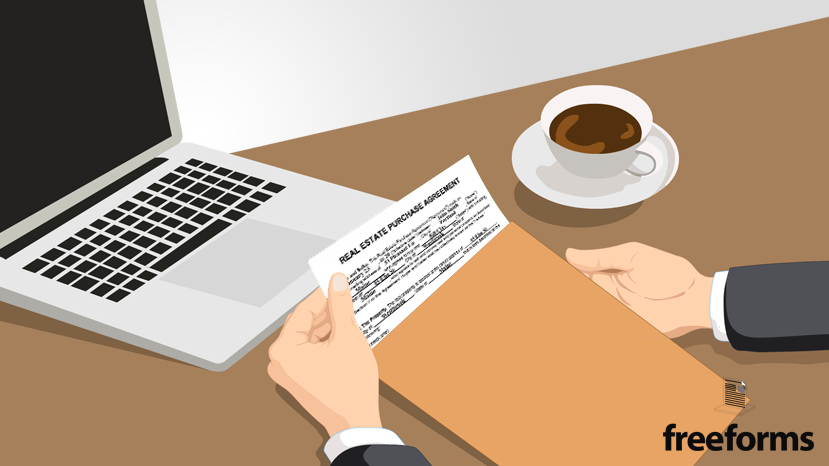
Hopefully, after showing your property to various parties, you will receive an offer from a prospective buyer looking to acquire the dwelling. This offer will come in the form of a purchase agreement that encompasses their desired terms. The seller should then review the listed terms and decide whether they agree to the conditions or not. If not, they may simply decline the offer altogether or submit a counteroffer expressing their demands. If they accept the terms provided, they can sign the offer converting it to a binding contract. Sellers should favor buyers who offer the following:
Letter of Pre-Approval – Is documentation distributed by a mortgage company validating the buyer’s ability to acquire financing. It can be a big waste of time and effort to enter into a sales contract with a buyer, only to find out later that they can’t even fund the purchase.
Earnest Money Deposit – This demonstrates that the party offering to purchase your home is serious and capable of buying the property. The amount usually ranges from 1-5% of the total sale price and later goes towards the purchaser’s down payment once the transaction is approved. The buyer will normally protect themselves with certain contingencies that ensure that the money is returned if the exchange doesn’t occur. But if the buyer decides to back out for any reason that is not safeguarded by a contingency, the seller may have the right to retain the funds held in escrow.
Cash Offer – When someone offers to purchase the home in cash without borrowing the money. This is considered more favorable to the seller because it takes less time to close on the property, as opposed to a transaction that involves a buyer who has to obtain financing from a loan company.
Some other considerations that the seller should think about when negotiating offers include:
Making Concessions – If the owner is really motivated to make a sale work, whether they aren’t receiving many offers, are in dire need of the money, or are looking to relocate by a certain date, they can offer the buyer certain incentives that will entice them to follow through with the exchange. Some concessions that might influence the buyer to carry out the deal include:
- Covering all the closing costs.
- Making repairs to the home.
- Upgrading certain appliances.
- Including any personal property that the purchaser may desire.
Owner Financing – This is when the seller acts as the lender and accepts payments from the purchasing party instead of them borrowing money from the bank. If both parties can come to an agreement on the terms of the loan, they must then execute a promissory note to be filed into the public record. Some of the benefits of owner/seller financing include:
- Certain tax breaks.
- Getting a return on your money from the loan’s interest rate percentage that is included with each payment provided by the buyer.
- Accelerates the closing process.
Step 6 – Meeting the Terms of the Purchase Agreement

After signing the offer, both parties will be required, by law, to follow through with the contractual obligations contained within the form. All federal & state regulations concerning the transfer of residential property must also be complied with in order to lawfully execute the sale. The rules can vary from state to state but sellers nationwide should always be prepared to supply the following:
Property Disclosure Form – Upon the acceptance of an offer, the seller is typically compelled, by law (depending on the state), to provide the buyer with a disclosure form giving an overview of the property’s current condition and indicate whether or not there are any adverse defects present within the home. Even if not required by the state’s law, this is commonly requested by prospective buyers in order to proceed with any type of transaction.
Lead-Based Paint Disclosure Form – No matter what state the sale is taking place in, the seller of a property built before 1978 is required to deliver this disclosure form to the buyer according to federal law.
Also, just because the home is now under contract, doesn’t mean that the sale is guaranteed to go through. In order to maintain the obligated terms of the contract, the buyer and seller must adhere to all the conditions made within the agreement. A few of the most common factors that can contribute to a delay in the closing process are:
Appraisal – Any findings that indicate that the property is worth less than the purchase price can halt the proceedings and require adjustments to be made to the agreement.
Financing – When a buyer is relying on a financial institution to provide the funds needed to purchase the home, it can sometimes go awry. If they have not been pre-approved, they may be notified during the course of the agreement that they do not meet the standards necessary to secure the loan. Actually, this can sometimes happen even if they were pre-approved, as the bank has the right to alter their decision if they receive any information during the process that indicates that the buyer is not qualified to obtain financing.
Inspection – If there is a major issue identified during the inspection, the buyer has carte blanche to terminate the contract unless the seller facilitates the issue by either incurring the cost of having a professional repair the issue or subtracting the cost of the repair from the purchase price. This could potentially prolong the amount of time it will take to reach the closing.
Title – Another element that can postpone a closing date is an issue with the property’s title. Most buyers will have a title search conducted while under contract to ensure that it is free and clear of any encumbrances. Complications that can be linked to the title include:
- Clerical Errors
- Encroachments
- Hidden Easements
- Invalid Deeds
- Unpaid Property Taxes
Step 7 – Getting the Home Ready for Transfer

As you approach the closing date, it is important that you start to coordinate your move out of the property. You can start by:
Moving Your Belongings Out of the Home – Sellers should have all items that are not included in the sale removed from the property at least twenty-four (24) hours before the buyer’s scheduled move-in date. Prepare in advance by:
- Packing smaller items into boxes weeks prior to your move, as the little things can be the most time-consuming.
- If you are going to hire a moving company, preemptively schedule a date to ensure that you will have the company booked before you are supposed to vacate the premises.
- If your other property is already available, start bringing items over to the new home on the days leading up to the move-out date.
Cleaning the Property – After the home is emptied, it is considered common courtesy to give it one final cleaning. In fact, it is not uncommon for a seller to pay a professional cleaning company to come in and service the property prior to closing. Just make sure to:
- Vacuum and wash the floors.
- Wipe down countertops and sinks.
- Empty/Clean the refrigerator.
- Scrub toilets and bathtubs.
- Take out any remaining trash.
Canceling Services Registered Under Your Name – On the days following up to your move-out date, contact any companies that currently provide services to the home and have them canceled or transferred to your new residence. Some services that you may want to adjust include:
- Utilities (gas, electric, water & sewage)
- Cable/Internet & Telephone
- Postal (change mailing address)
- Trash Collection
- Security System
- Newspaper Subscription
- Homeowners Insurance Policy (only cancel after the title search has been performed)
Secure the Property – Once you feel that the property is fully prepared to be transferred over to the new owner and you are ready to leave, it is vital that you properly close down the home. Ensure that the following tasks occur:
- Turn off any unnecessary lights/electricity.
- Unplug any potential hazards.
- Shut off any water valves that could potentially cause flooding.
- Set the thermostat to an appropriate climate.
- Close and fasten all the home’s windows.
- Lock all the doors that give access to the property.
Final Walk-Through – Grant the buyer access to the property within twenty-four (24) hours of the closing. This allows them to examine the property one last time before finalizing the transaction, giving them the chance to verify that the property is as it should be.
Step 8 – Closing on the Property

Finally, the day has arrived where you will be officially closing on your property. This will usually take place at the title/escrow company’s office where you will be executing all the final paperwork that is necessary to formally conclude the sale. It is important that you bring the following materials:
- All the property’s keys and passcodes.
- Additional Funds (if necessary)
- The deed to the home (if the mortgage has been paid off).
- Invoices of any repairs made per the buyer’s request.
- Any other documents regarding the property or its appliances.
Signing the Closing Documents – Since you are selling your own home and do not have a listing agent assisting you with the presented documentation, it is important that you take your time and thoroughly read each form. If there are any sections that you are unsure of, ask the closing/escrow agent present (or attorney, if applicable) to clarify the information provided. Once you have a full understanding of all the paperwork distributed, you may sign the following documents within the designated areas to complete the process:
- Bill of Sale
- Certificate of Title
- Closing Statement
- Mortgage Note (or Loan Payoff)
- Tax Disclosure
Receiving the Net Proceeds of the Sale – Congratulations! You may now collect your money from the title/escrow company. But keep in mind, all the money you receive from the sale will not directly go into your pocket. You must deduct:
- Balance of your current mortgage.
- Any property taxes or other unpaid bills.
- Escrow/Attorney Fees
- Commission of the buyer’s agent.
This will all be arranged by the title/escrow company at the time of closing, who will then give you a full breakdown of all the charges imposed. Whatever is left over is yours, whether it goes towards a new home or into your bank account.
How to Write a Real Estate Purchase Agreement
Step 1 – Download the document in Adobe PDF or Microsoft Word (.docx) .
Step 2 – Identifying the Buyer & Seller – Fulfill the first section of the form regarding the participating parties by entering the following information:
- Date in which the agreement is being put into effect (month, day, & last 2 digits of the year)
- Buyer’s Full name
- Buyer’s Mailing Address (street, city, & state)
- Seller’s Full Name
- Seller’s Mailing Address (street, city, & state)

Step 3 – Identifying the Property for Sale – Next, you are going to want to describe the property that is being sold/purchased by inputting:
- Address of the Property (which may be the same as the seller’s mailing address)
- Single-Family Home
- Condominium
- Planned Unit Development (PUD)
- Other (If none of the abovementioned options apply, you may check this box and insert your own description of the property.)
- Tax Parcel Information – Enter the number associated with the property’s “Parcel ID” or “Tax Map & Lot” (this may differ from state to state).
- Personal Property – Be sure to write in any of the seller’s personal property that has been agreed to be included with the sale of the home (be as specific as possible).
- Fixtures – A fixture is something that is physically attached to the structure and is considered real property. If the seller would like to remove a fixture and keep it for their next home, they must stipulate it within this section.
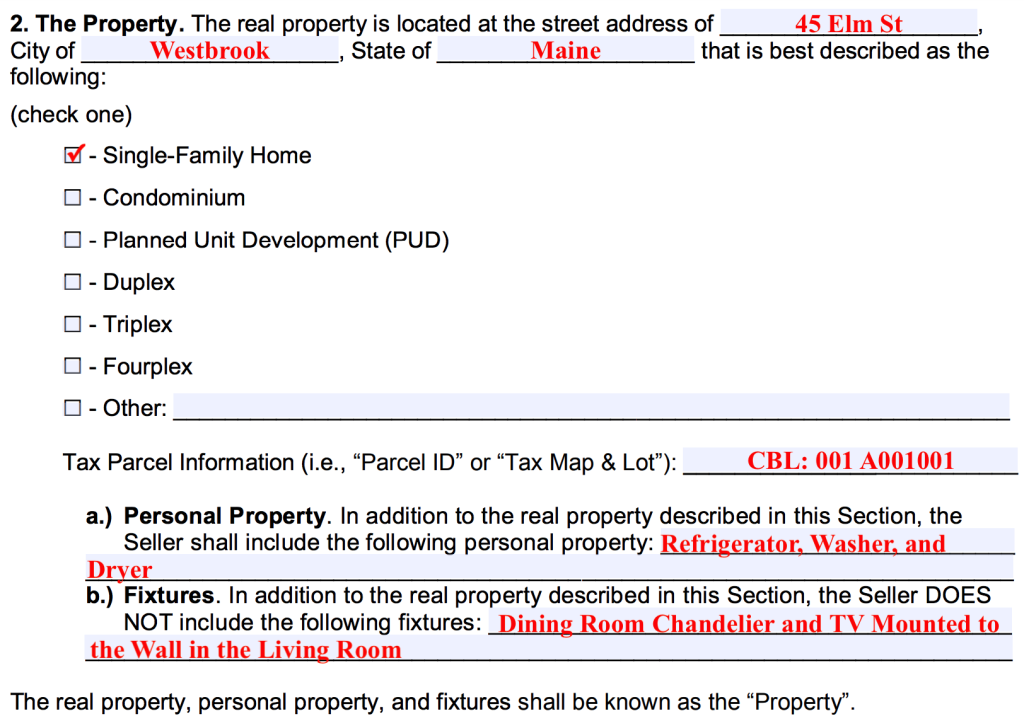
Step 4 – Stipulating the Purchase Price & Method of Funding – In the top portion of this section, enter the proposed purchase price into the corresponding spaces (in numerical and written form). Once the purchase price has been established, select how the buyer will supply the funding for the acquisition. They have the following options:
- Check the box indicating that it is an “All Cash Offer”.
- Enter a date & time in which the buyer has to supply the seller with documentation from a third (3rd) party that confirms that they, in fact, do have the necessary funds to pay the full purchase price of the property.

- Marking the box next to “Bank Financing”.
- Conventional
- Other – If the type of loan being used is not listed, select this option and input your own description (for example, a USDA loan).
- Provide a date in which the purchaser has to furnish the seller with a letter of pre-approval from the lender.
- The loan approval is contingent on the lease, sale, or recording of another property.
- The loan approval is not contingent on the lease, sale, or recording of another property.
- Enter the number of days the seller has to provide written notice to the buyer stating that they are terminating the contract due to the buyer’s failure to supply the needed loan approval documents by the date recorded in Section C.
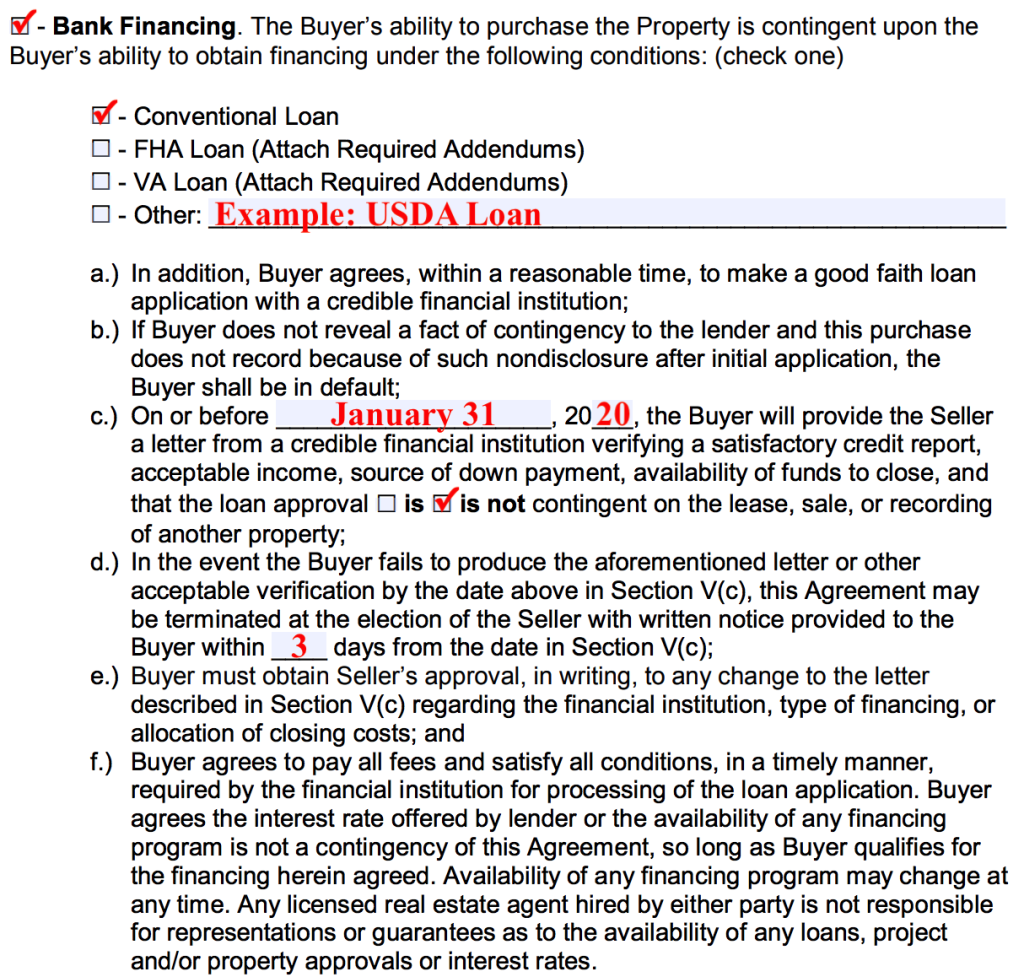
- Check the box that indicates “Seller Financing”.
- Enter the amount of the loan in dollars.
- Record the value of the down payment.
- Insert the percentage for the interest rate.
- Enter the term of the loan (in months or years).
- Specify the date in which the buyer must deliver any requested documents to the seller by (month, day, & last 2 digits of the year).
- Select a date in which the seller has to approve the purchaser by (month, day, & last 2 digits of the year).
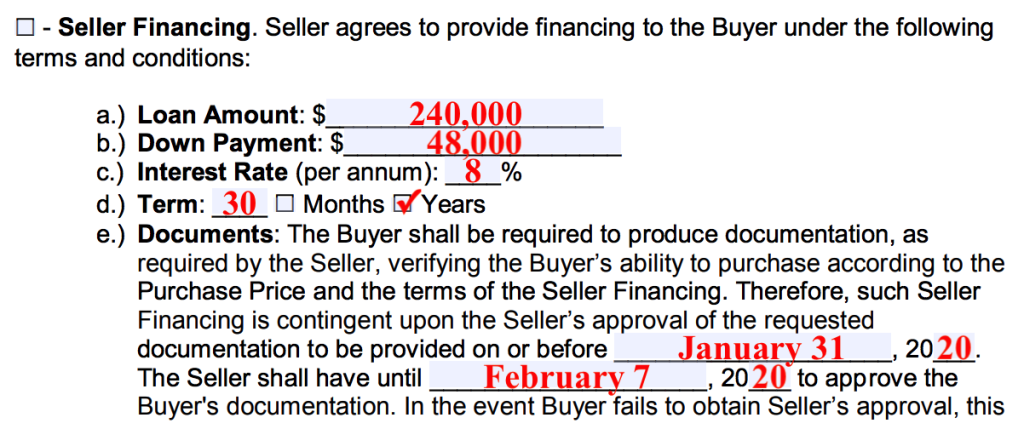
Step 5 – Earnest Money/Sale of Another Property Contingency/Closing Costs – Determine the following aspects of the sale:
- Insert the amount of the deposit in dollars.
- Supply a date & time in which the buyer has to make the deposit.
- Check whether or not the earnest money is required to be held in a separate trust or escrow account.
- Buyer’s Mailing Address (street, city, state)
- Number of days the buyer has to sell their home from the effective date of the purchase agreement.
- Both Parties
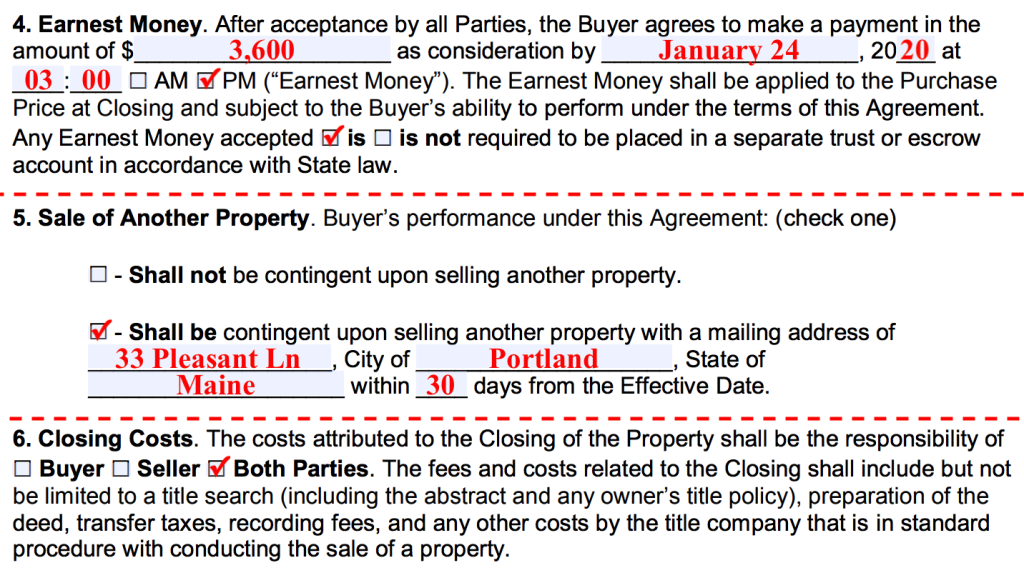
Step 6 – Closing & Survey Details – The following sections require the individual filling out the form to define the following terms:
- Closing – Establish a date & time in which the closing must take place by.
- Enter the number of business days from closing that the buyer has to notify the seller that there was an issue discovered during the course of the property’s survey.
- Enter the number of business days the seller has to remediate the issue from the time of being notified (must also be prior to closing).
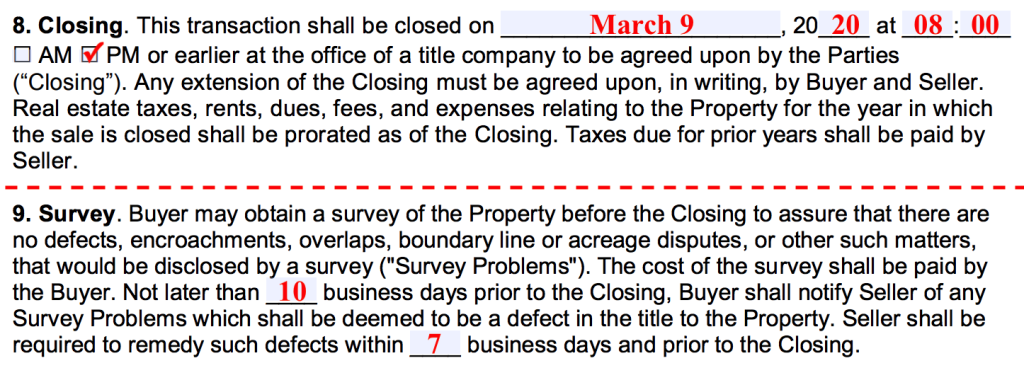
Step 7 – Title – In regard to the “Title Search Report”, the party supplying the information to the form should:
- Include the number of business days the buyer has to inform the seller that there is an issue with the title after receiving the report.
- Register the number of business days the seller has to rectify the problem.
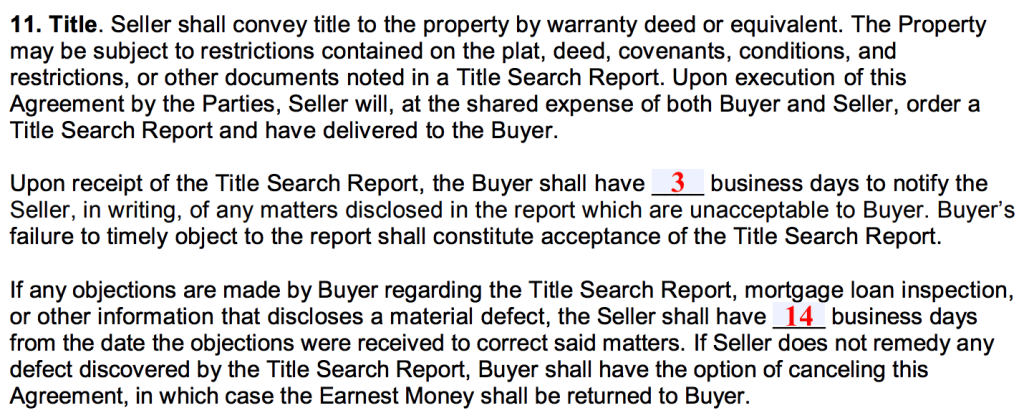
Step 8 – Property Condition – This portion of the agreement essentially states that the seller agrees to maintain the current condition of the home until the time of the sale and that the buyer has the right to hire a licensed inspector to further investigate the property. The following conditions should be recorded concerning the inspection:
- Provide the date & time that the buyer has to have the property inspected by.
- Issue a date & time that the buyer has to present the seller with any newly discovered property defects. This must be delivered, in writing, by the time listed.
- Input the number of business days that both parties have to come to an accord on how to remedy any recently uncovered defects contained within the home.
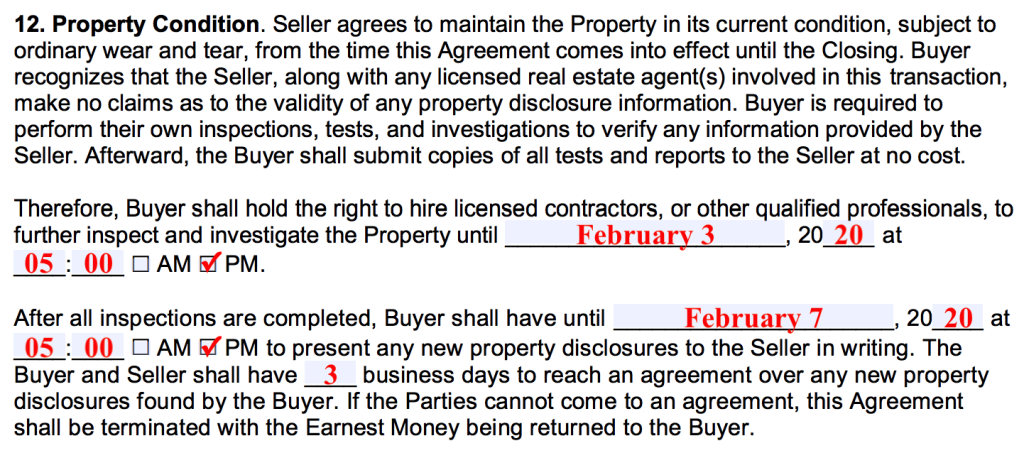
Step 9 – Appraisal & Termination – Outline the requirements associated with the following components of the sale:
- If, for whatever reason, you feel an appraisal is not necessary to continue with the exchange, check the box stating that the agreement shall not be contingent upon an appraisal being equal to or greater than the prearranged sales price.
- As for the majority of individuals taking part in the sale of real estate, mark the second (2nd) option stating that the transaction shall be contingent upon an appraisal being equal to or greater than the asking price that was settled upon. After indicating your selection, insert a number of business days that the parties will have to re-negotiate the terms of the contract if an unsatisfactory appraisal does occur.
- Termination – Enter the number of days that it will take to return the buyer’s earnest money deposit in the event that the agreement is terminated.
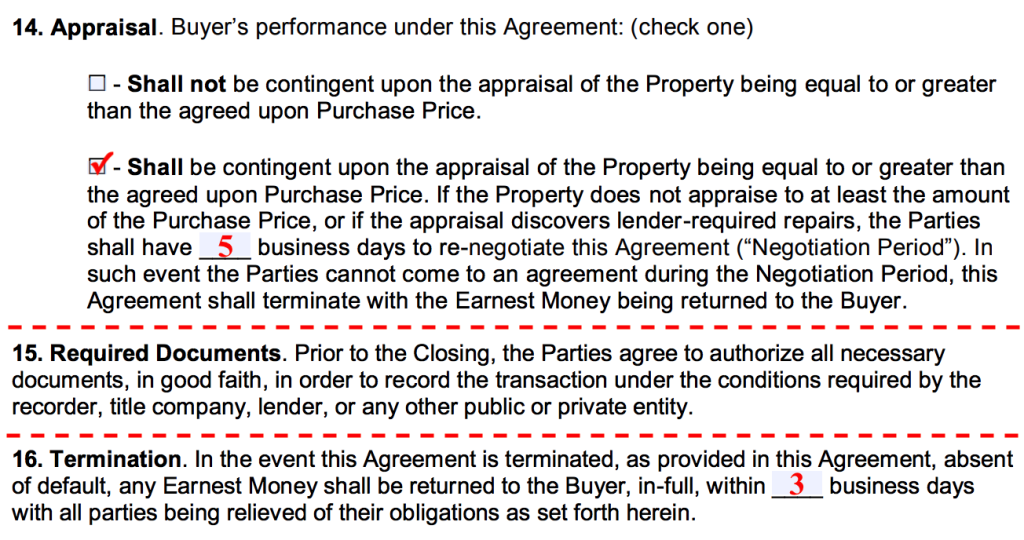
Step 10 – Governing Law – This portion of the form just simply requests that the user provide the name of the state where the sale is taking place and whose laws govern any local real estate transactions.

Step 11 – Offer Expiration – Set a date & time from the effective date of the contract in which the receiving party has to accept the agreement and sign it. If the time limit is exceeded, the offer will expire and is no longer valid.

Step 12 – Disclosures and Additional Terms & Conditions – The final two (2) sections regarding the terms of the contract request that you cover the following areas of the agreement:
- Checking the primary box stating that there are no addendums or disclosures attached to the contract.
- Checking the secondary box confirming that there are indeed addendums and disclosures attached to the contract.
- If the lead-based paint disclosure is attached, check the box certifying this fact.
- Write-in any additional disclosures or addendums and check the corresponding box to confirm its inclusion.
- Additional Terms & Conditions – If there are any additional terms & conditions that are not present within the content of the purchase agreement that you would like to include, then write them into the available space provided (for example, the rent-back clause contained within the screenshot below).
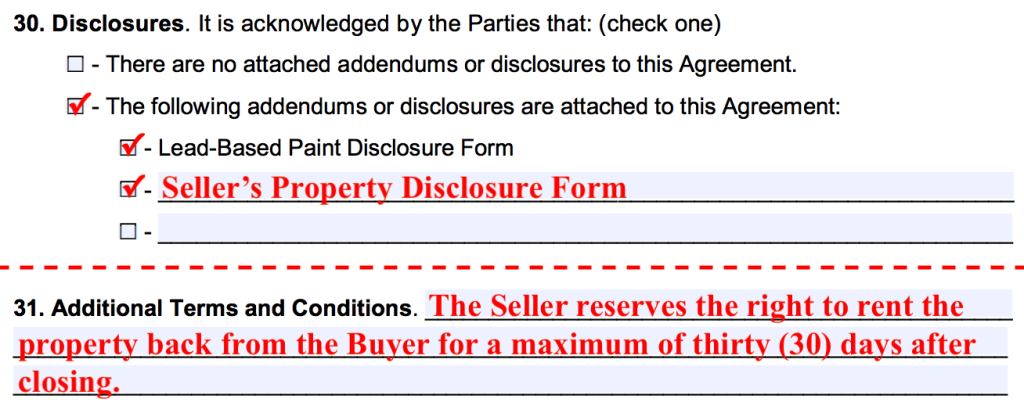
Step 13 – Signatures – The final portion of the agreement requires all participating parties to supply the following:
- Seller’s Signature & Date
- Seller’s Signature & Date (if there is a second owner of the home)
- Buyer’s Signature & Date
- Buyer’s Signature & Date (if there is another purchaser involved in the sale)
- Agent’s Signature & Date (if there is a listing agent involved)
- Agent’s Signature & Date (if there is a buyer’s agent involved)

Once all the above fields have been executed, the document will become a binding purchase agreement that is enforceable by law.
Thank you for downloading!
How would you rate your free form.
Language selection
- Français fr
Assignment of a Purchase and Sale Agreement for a New House or Condominium Unit
From: Canada Revenue Agency
Effective May 7, 2022, all assignment sales in respect of newly constructed or substantially renovated residential housing are taxable for GST/HST purposes. This publication will be updated to reflect this legislative change. For more information about the legislative amendment, refer to GST/HST Notice 323, Proposed GST/HST Treatment of Assignment Sales .
GST/HST Info Sheet GI-120 July 2011
This info sheet explains how the GST/HST applies to the assignment of a purchase and sale agreement for the construction and sale of a new house.
The term "new house" used in this info sheet refers to a newly constructed or substantially renovated house or condominium unit. A house that has been substantially renovated is generally given the same treatment under the GST/HST as a newly constructed house. Extensive modifications must be made to a previously occupied house in order to meet the definition of a "substantial renovation" for GST/HST purposes. For a full explanation of the factors to consider in deciding if a substantial renovation has taken place, refer to GST/HST Technical Information Bulletin B-092, Substantial Renovations and the GST/HST New Housing Rebate .
In this publication, a house includes a single unit house, a semi detached house, a duplex, a rowhouse unit and a residential condominium unit (condo unit), but does not include a mobile home or floating home.
Where a person enters into a purchase and sale agreement with a builder for the construction and sale of a new house, the person may be entitled to assign their rights and obligations under the agreement to another person (an assignee). Generally, the result of the assignment is that the purchase and sale agreement is then between the builder and the assignee.
This publication addresses the situation where
- a purchaser (referred to as the first purchaser) enters into a purchase and sale agreement with a builder (Builder A) for the construction and sale of a new house, and
- the first purchaser subsequently assigns the agreement to an assignee (referred to as the assignee purchaser) before Builder A transfers possession or ownership of the house to the first purchaser and before any individual has occupied the house as a place of residence or lodging.
Generally, upon entering into an agreement for the construction and sale of a new house, the first purchaser is considered to have acquired an interest in the house. For GST/HST purposes, the assignment of the agreement to the assignee purchaser is normally considered to be a sale of the first purchaser's interest in the new house. The sale of an interest in a new house is generally taxable where the person selling the interest is a builder of the house.
For GST/HST purposes, the term "builder" is specifically defined and is not limited to a person who physically constructs a house. There are several instances in which an individual or other person is a builder for GST/HST purposes. For more information on persons who are included in the definition of "builder", refer to GST/HST Memorandum 19.2, Residential Real Property .
This info sheet addresses only whether a person is a builder as described in the following paragraph.
Primary purpose: selling the house or an interest in the house or leasing the house in certain circumstances
A builder includes a person who acquires an interest in a new house before it has been occupied by an individual as a place of residence or lodging for the primary purpose of selling the house or an interest in the house or leasing the house, other than to an individual who is acquiring the house otherwise than in the course of a business or adventure or concern in the nature of trade. When that person is an individual, the individual must acquire the interest in the course of a business or an adventure or concern in the nature of trade in order to be a builder described by this paragraph.
Even if a person is not a builder as described in the preceding paragraph, the person may be a builder based on one of the other definitions of the term as described in GST/HST Memorandum 19.2.
Assignment of a purchase and sale agreement by a person other than an individual
Where a person other than an individual (e.g., a corporation) is a builder as described in the section "Primary purpose: selling the house or an interest in the house or leasing the house in certain circumstances" and the person assigns a purchase and sale agreement for a new house, the person's sale of the interest in the house is subject to the GST/HST whether the sale takes place in the course of a business, an adventure or concern in the nature of trade, or otherwise.
Assignment of a purchase and sale agreement by an individual
If an individual enters into a purchase and sale agreement for one of the primary purposes described in the section "Primary purpose: selling the house or an interest in the house or leasing the house in certain circumstances", the sale of the interest in the house (or the house itself) is normally considered to be made in the course of an adventure or concern in the nature of trade or, depending on all of the surrounding circumstances, in the course of a business. If it is established that an individual is selling an interest in a new house in the course of a business or adventure or concern in the nature of trade, the individual is considered to have entered into the purchase and sale agreement for the primary purpose of selling the house or an interest in the house.
Whether the activity of acquiring an interest in a house, as a result of entering into a purchase and sale agreement, is done in the course of a business or an adventure or concern in the nature of trade is a question of fact. For more information on how to determine whether an activity is done in the course of a business or an adventure or concern in the nature of trade, refer to Appendix C of GST/HST Memorandum 19.5, Land and Associated Real Property .
Factors in determining the primary purpose
All of the relevant factors surrounding entering into a purchase and sale agreement should be considered in determining the primary purpose for a person's acquisition of an interest in a new house.
The following factors may indicate that, for GST/HST purposes, a person entered into a purchase and sale agreement for the primary purpose of selling an interest in the new house or the house itself. The factors are not listed in any particular order and there is no intent to weigh one more heavily than another.
- The person offers to sell their interest in the house or takes other actions to attract buyers before, or while, the house is under construction.
- The person finances the purchase of the house by a short-term mortgage, or an open mortgage that can be paid off without penalty, rather than by a long-term or closed mortgage.
- Financing of the house is beyond the person's means and that person is relying on the increased value and saleability of the house, or an interest in the house, in a rising housing market.
- The person is an individual and their stated intention to occupy the house as a place of residence is not supported by the circumstances of the case. For example, an individual has a family of four and enters into a purchase and sale agreement for a one-bedroom condo unit where they are not contemplating any changes in family circumstances.
- The person's pattern of activity is such that their occupancy of the house does not have the qualities or characteristics of being permanent. For example, the person purchases more than one house at or around the same time. This factor may be given extra weight where the person has previously entered into a purchase and sale agreement for purposes of selling the house or an interest in the house. There are no outward indicators to support a contrary primary intention (i.e., an intention contrary to an intention of resale). For example, an individual is selling a condo unit, one or more of the above factors are present, there are no physical actions or evidence that the individual's primary intention was to live in the condo unit, use it as a vacation home, or rent it to another individual for use as their place of residence, and no evidence that the sale of the condo unit was triggered by some unforeseen event.
In order for the acquisition of an interest in a new house to be for one of the primary purposes described in the section "Primary purpose: selling the house or an interest in the house or leasing the house in certain circumstances", the intention to sell the house or an interest in it, or to lease the house in the manner described in that section, must have existed at the time of acquiring the interest. Nonetheless, the intention at the time of acquisition may be demonstrated over a period of time.
If an individual acquired an interest in the house for the primary purpose of using it as a place of residence, the person is not considered to be a builder of the type described in this info sheet even if, at a later point in time, the person sells the house or an interest in the house. However, the person may still be a builder if the person meets one of the other definitions of that term as described in GST/HST Memorandum 19.2.
The following examples illustrate when a person may or may not be a builder of a new house.
Sarah, Francine, and Angela are roommates renting a three-bedroom house. They entered into a purchase and sale agreement with a builder in January 2010 for a one-bedroom condo unit in a new condominium complex that was to be built. The purchase price under the agreement was $300,000 and the closing date was July 31, 2013.
In March 2011, the fair market value of the new condo unit had increased by 50%. They entertained several offers for the sale of their interest in the condo unit before assigning it to James. No individual had occupied the condo unit as a place of residence or lodging when they sold their interest in the unit. They split the proceeds, which they each used as a down payment to buy their own homes.
As it would not be practical for the three individuals to live in the condo unit together, they considered several offers for their interest in the unit, and there are no indicators to support a contrary intention, Sarah, Francine and Angela are considered to have acquired their interest in the condo unit for the primary purpose of selling the unit or an interest in it. The sale is considered to be made in the course of a business or adventure or concern in the nature of trade. Accordingly, Sarah, Francine, and Angela are all builders of the condo unit for GST/HST purposes. As they are builders of the unit and the sale of their interest in the unit is not exempt, GST/HST applies to the sale of each of their interests.
Pascal and Chantal own a four-bedroom house where they live with their three children. This is the only home they have ever owned and lived in. They have never purchased any other real property.
In June 2009, they entered into a purchase and sale agreement with a builder for a 1-bedroom condo unit in a new high-rise condominium complex that was to be built. The purchase price under the agreement was $275,000 and the closing date was June 30, 2010. In May 2010, they sold their interest in the new condo unit for $400,000 before it had been occupied by any individual as a place of residence or lodging. They used the sale proceeds to build an addition to their current home.
Although Pascal and Chantal have no history of buying and selling real property, it would not be practical for their family of five to occupy the condo unit as their place of residence. Lacking evidence to support a contrary intention, their primary purpose in acquiring the interest in the condo unit is considered to be for the purpose of selling the condo unit or an interest in it in the course of a business or an adventure or concern in the nature of trade. Accordingly, they are builders of the new condo unit for GST/HST purposes. As the sale of their interest in the unit is not exempt, GST/HST applies to the sale of their interest.
Eric and Gina owned a 3-bedroom house where they lived with their 3 children. They entered into a purchase and sale agreement with a builder in October 2010 to purchase a new 4-bedroom house that was to be built. They intended to use the new house as their primary place of residence as it was located much closer to the children's school and to Eric and Gina's workplaces and had more space. The closing date is July 31, 2011.
Eric and Gina sold their current home in January 2011 and moved into a rented home they planned to live in until their new house was ready. However, in June 2011, Gina's mother became ill and moved in with them as she was no longer able to live on her own.
Eric and Gina decided that the new house would no longer be large enough and that they would now need a house with a granny suite. They sold their interest in the new 4-bedroom house so that they could buy a bigger home that would suit their changed needs.
Eric and Gina's sale of their original home and temporary move to a rented house during the construction of the new home and their choice to purchase a home located closer to school and work support that their intention in acquiring the interest in the new house was to use the house as their primary place of residence. Given this, and the fact that their only reason for selling the interest was due to a change in personal circumstance (i.e., the new house would no longer accommodate their family's needs), they are not considered to have acquired the interest in the house for the primary purpose of selling it. Accordingly, they are not builders of the new house for GST/HST purposes and the sale of their interest in the house is exempt.
Cindy entered into a purchase and sale agreement with a builder in November 2010 for a new house that was to be built. She intended to use the house as her primary place of residence. Her new home would be located within walking distance from her workplace and would be closer to her family than the apartment she is currently renting. The closing date for the purchase is September 30, 2011.
In July 2011, Cindy's employer announced that it was relocating to another city located three hours away. To keep her current job, Cindy had to move to that city. She sold her interest in the house to John.
Since Cindy had intended to use the house as her primary place of residence and her only reason for selling her interest in the house was due to work relocation, she did not acquire the interest in the house for the primary purpose of selling it. Therefore she is not a builder of the house for GST/HST purposes and the sale of her interest in the house is exempt.
Assignment fees
The consideration charged for the sale of an interest in a house generally includes amounts that a person paid to a builder (e.g., a deposit) and that the person wants to recover when assigning their interest in the house. The sale price for the interest may also include a profit, i.e., an amount over and above amounts the person had paid to the builder. If a person's sale of their interest to an assignee purchaser is taxable, the total amount payable for the sale of the interest is subject to GST/HST, including any amount the person paid as a deposit to the builder, whether or not such an amount is separately identified.
A first purchaser enters into a purchase and sale agreement for a new house with a builder (Builder A) and pays a deposit of $10,000 at that time. The first purchaser does not make any further payments to Builder A. The first purchaser subsequently assigns the agreement to an assignee purchaser for $15,000. If the sale of the interest in the house from the first purchaser to the assignee purchaser is subject to GST/HST, tax applies to the full $15,000. This is the case even if the assignment agreement identifies that the $10,000 is a recovery of the deposit that the first purchaser paid to Builder A.
The assignment of a purchase and sale agreement for a new house may be subject to the approval of the builder with whom the first purchaser originally entered into the agreement to construct and sell the new house. The agreement may list conditions related to the first purchaser's right to assign the agreement to an assignee purchaser and, in many cases, the builder charges a fee to the first purchaser for the assignment of the agreement to another person.
The fee charged by the builder in such circumstances is generally subject to the GST/HST.
Eligibility for a GST/HST new housing rebate and provincial new housing rebate (where applicable) where a purchase and sale agreement is assigned
The GST/HST new housing rebate, and where applicable, a provincial new housing rebate, may be available for a new house purchased from a builder and for owner-built new housing. Guide RC4028, GST/HST New Housing Rebate , sets out the eligibility criteria for both types of GST/HST new housing rebates and provincial new housing rebates.
If the first purchaser (the assignor) makes a taxable sale of an interest in a house, i.e., the first purchaser is a builder and assigns the purchase and sale agreement to an assignee purchaser, the first purchaser would not be eligible for either a GST/HST new housing rebate or provincial new housing rebate as they did not acquire the house for use as their primary place of residence. Even if the sale of the interest in the house by the first purchaser is not subject to GST/HST (i.e., in situations where the first purchaser is not a builder of the house), the first purchaser would generally not be eligible for either a GST/HST new housing rebate or a provincial new housing rebate as the conditions for claiming the rebates are not met (e.g., ownership of the house would not transfer to the first purchaser, but to the assignee purchaser).
The assignee purchaser, if an individual, may be eligible for a GST/HST new housing rebate, and where applicable a provincial new housing rebate, where the assignee purchaser receives an assignment of a purchase and sale agreement for a new house. The assignee purchaser would have to meet the eligibility conditions for the rebates as set out in Guide RC4028.
Where a purchase and sale agreement for a new house is assigned, there may be two builders of the house – the original builder (Builder A) and the first purchaser (the assignor). If that is the case, an assignee purchaser would generally have to pay the GST/HST to Builder A for the purchase of the new house and to the first purchaser for the purchase of the interest in the new house.
Claiming a GST/HST new housing rebate when there is more than one builder
In some cases, the builder of a new house pays or credits the amount of the GST/HST new housing rebate, and where applicable, a provincial new housing rebate, to the purchaser of the house. In this case, the builder credits the amount of the new housing rebates to the purchaser by reducing the total amount payable for the purchase of the house by the amount of the expected rebates.
Where this happens, the purchaser and the builder have to sign Form GST190, GST/HST New Housing Rebate Application for Houses Purchased from a Builder , and the builder has to send the form to the Canada Revenue Agency (CRA). As the purchaser receives the amount of the rebate from the builder, the builder may claim the amount as a credit against its net tax when it files its GST/HST return.
Only one new housing rebate application can be made for each new house. Therefore, an assignee purchaser cannot submit a rebate application through a builder (Builder A) for the tax paid to Builder A on the purchase of the house and submit a second rebate application through the first purchaser (the assignor), or directly to the CRA, for the tax paid to the first purchaser on the purchase of the interest in the house.
In such cases, the assignee purchaser may want to file their new housing rebate application directly with the CRA rather than through Builder A. In this way, the assignee purchaser can include in the new housing rebate application the tax paid to Builder A and the tax paid to the assignor in determining the amount of their GST/HST new housing rebate and, where applicable, a provincial new housing rebate.
This info sheet does not replace the law found in the Excise Tax Act (the Act) and its regulations. It is provided for your reference. As it may not completely address your particular operation, you may wish to refer to the Act or appropriate regulation, or contact any CRA GST/HST rulings office for additional information. A ruling should be requested for certainty in respect of any particular GST/HST matter. Pamphlet RC4405, GST/HST Rulings – Experts in GST/HST Legislation explains how to obtain a ruling and lists the GST/HST rulings offices. If you wish to make a technical enquiry on the GST/HST by telephone, please call 1-800-959-8287.
Reference in this publication is made to supplies that are subject to the GST or the HST. The HST applies in the participating provinces at the following rates: 13% in Ontario, New Brunswick and Newfoundland and Labrador, 15% in Nova Scotia, and 12% in British Columbia. The GST applies in the rest of Canada at the rate of 5%. If you are uncertain as to whether a supply is made in a participating province, you may refer to GST/HST Technical Information Bulletin B-103, Harmonized Sales Tax – Place of Supply Rules for Determining Whether a Supply is Made in a Province .
If you are located in Quebec and wish to make a technical enquiry or request a ruling related to the GST/HST, please contact Revenu Québec at 1-800-567-4692. You may also visit the Revenu Québec Web site to obtain general information.
All technical publications related to GST/HST are available on the CRA Web site at www.cra.gc.ca/gsthsttech .
Page details

What is a Purchase and Sale Agreement?
Reading Time: 4 minutes
When it comes to buying a home , a lot of important paperwork needs to be completed before you can call a house yours. One of these important pieces of paperwork is the purchase and sale agreement.
To help you navigate this document, we’ll go over what a purchase and sale agreement is, what it includes, and what happens after. So whether you’re selling a home in Boston, MA, or buying a home in Dallas, TX , read on to learn more about what goes into a purchase and sale agreement during a real estate transaction.

What is a purchase and sale agreement?
A purchase and sale agreement, also known as a PSA or P&S for short, is the document received after mutual acceptance of an offer. It states the final sale price and all terms of the purchase in a real estate transaction. A PSA can vary by state. They typically consist of the final sale price, earnest money details, closing date, title information, and contingencies. Timelines for inspections, securing financing, and the closing date, along with any other deadlines and anything else the buyer/seller requests, will be detailed in the agreement.

Deciding between renting or buying your next home?
The purchase and sale agreement may sound similar to the purchase agreement, but they are not the same.
Purchase and Sale Agreement (PSA): This document outlines the specific terms and conditions agreed upon by the buyer and seller. It includes details such as the final sale price, earnest money, timelines for inspections and financing, contingencies, and closing date. Both parties sign the PSA to indicate their mutual acceptance of these terms.
Purchase Agreement: This is the final paperwork that both parties sign to complete the sale of the home. After all the terms outlined in the PSA have been met, the purchase agreement is signed, finalizing the transaction.
What does the PSA consist of?
The specific items in this contract vary by state, but will almost always include the following:
1. Final sale price
The PSA will include the purchase price agreed upon by the buyer and seller.. Note that this price might change during negotiations before the closing date. For instance, if the buyer’s home inspection turns up a problem with the home, the buyer may be able to negotiate a reduced purchase price.
2. Earnest money details
The purchase and sale agreement will include information on the earnest money deposit, such as the dollar amount and instructions for making the deposit. In most areas, the buyer will need to deposit a personal or cashier’s check which is held with a neutral third party. These third-party companies can be escrow companies, title companies, or law firms. They will need to deposit within one to three days of mutual acceptance.
3. Closing date
The closing date will be included in the purchase and sale agreement (PSA). On this date, the transfer of property is recorded with the local government, and the seller receives payment for the home. While the closing date is specified in the PSA, it may change due to unforeseen events, such as delays in financial paperwork.
4. Title company
Information about your title company will be included in the purchase and sale agreement. As the buyer, you always have the right to select a title company. You should talk to your agent or attorney if you have any questions about choosing a title company.
5. Title condition
The purchase and sale agreement will include an agreement that the seller will provide a clear or marketable title of ownership to the buyer.
6. Contingencies
Contingencies are conditions that must be met in order for the home purchase to be completed. A buyer or seller may cancel a sale if one of the contingencies can’t be met. Here are some examples of common contingencies .
Purchase and sale agreement FAQs
Who writes the purchase and sale agreement .
Either the buyer’s agent or the real estate attorney will draft up the contract. This depends on what state the home resides in. In states where escrow agents handle the closing process, the buyer’s agent is responsible for preparing the PSA document. In areas where attorneys handle the closing, the attorneys will prepare the document. The buyer, seller, and their respective agents will sign the document.
Who pays for the purchase and sale agreement?
In most cases, the costs associated with preparing the purchase and sales agreement are left to the buyer. Since it’s considered a closing cost, the buyer and seller can negotiate to split the cost. Sellers may also agree to cover some of the cost as an incentive to the buyer.
Are PSAs legally binding?
Purchase and sale agreements, like any other contract, are legally binding. If any party fails to hold up their end of the agreement, legal action or lawsuits can be pursued to recover any damages. Having a real estate lawyer go over the PSA can lessen the risk of violating the terms of the agreement.
What happens after the purchase and sale agreement?
The buyer and seller will sign the PSA and the earnest money will be deposited, and then the buyer and third-party companies will begin the home inspections, title searches, loan agreements, and anything else outlined in the agreement that needs to be checked. It can take several weeks for the finalization of the purchase and sale agreement. This is because there might be problems that arise during an inspection. The buyer will sign the purchase agreement at closing.
Chibuzo is a Content Marketing Specialist on Redfin’s content marketing team. He’s been with Redfin for over two years and enjoys running and playing basketball when he’s not writing. His dream home is a Mediterranean-style house with a large kitchen and plenty of windows.
Find the right loan for the home you love
Popular homes for sale.

Browse homes you'll love
Relevant articles.

Home Buying Checklist: A Step-by-Step Survival Guide for the Home Buying Process

68 Questions to Ask When Buying a House


The Ultimate Final Walk-Through Checklist Before Closing on a Home

How Long Does an Appraisal Take?

What is a Plat Map? Here’s What You Need to Know

10 Pros and Cons of Living in Washington
Popular posts, latest posts.

Natural Disasters in Arizona: What Homeowners and Renters Need to Know

5 of the Most Expensive Homes for Sale in California Right Now Listed by Redfin

17 Beautiful Places in New York City That Are Sure to Delight

What Are the Four C’s of Credit? How Lenders Qualify You for a Mortgage

9 Fun Things to Do in Indianapolis, IN, To Help You Get to Know Circle City

Is Rochester, NY, a Good Place to Live? 6 Pros and Cons to Consider for Newcomers

Lake Towns in Pennsylvania: 10 Beautiful Lakes in Pennsylvania to Live on in 2024

Should I Lock in My Mortgage Rate Now That Rates Are Dropping?

Lake Towns in New York: 12 Beautiful Lakes in New York to Live on in 2024

Lake Towns in New Jersey: 7 Beautiful Lakes in New Jersey to Live on in 2024

7 Charming Small Towns in Maine You’ll Want to Call Home

How to Buy a House in 15 Steps: The Ultimate Guide
Follow redfin, connect with a redfin agent.
- Albuquerque Real Estate
- Alexandria Real Estate
- Anchorage Real Estate
- Arlington Real Estate
- Ashburn Real Estate
- Atlanta Real Estate
- Aurora Real Estate
- Austin Real Estate
- Bakersfield Real Estate
- Baltimore Real Estate
- Baton Rouge Real Estate
- Beaverton Real Estate
- Bend Real Estate
- Birmingham Real Estate
- Boca Raton Real Estate
- Boise Real Estate
- Boston Real Estate
- Boulder Real Estate
- Bowie Real Estate
- Brentwood Real Estate
- Buffalo Real Estate
- Burlington Real Estate
- Cape Coral Real Estate
- Chandler Real Estate
- Charleston Real Estate
- Charlotte Real Estate
- Chattanooga Real Estate
- Chicago Real Estate
- Cincinnati Real Estate
- Colorado Springs Real Estate
- Columbia Real Estate
- Columbus Real Estate
- Dallas Real Estate
- Denver Real Estate
- Des Moines Real Estate
- Detroit Real Estate
- El Paso Real Estate
- Elk Grove Real Estate
- Eugene Real Estate
- Fairfax Real Estate
- Flagstaff Real Estate
- Fort Collins Real Estate
- Fort Lauderdale Real Estate
- Fort Myers Real Estate
- Fort Worth Real Estate
- Frederick Real Estate
- Fremont Real Estate
- Fresno Real Estate
- Frisco Real Estate
- Gilbert Real Estate
- Glenview Real Estate
- Henderson Real Estate
- Honolulu Real Estate
- Houston Real Estate
- Indianapolis Real Estate
- Irvine Real Estate
- Jacksonville Real Estate
- Jersey City Real Estate
- Kansas City Real Estate
- Knoxville Real Estate
- Lake Tahoe Real Estate
- Las Vegas Real Estate
- Little Rock Real Estate
- Long Island Real Estate
- Los Angeles Real Estate
- Louisville Real Estate
- Madison Real Estate
- Manhattan Real Estate
- Manteca Real Estate
- Memphis Real Estate
- Mesa Real Estate
- Miami Real Estate
- Milwaukee Real Estate
- Minneapolis Real Estate
- Modesto Real Estate
- Myrtle Beach Real Estate
- Naperville Real Estate
- Naples Real Estate
- Nashua Real Estate
- Nashville Real Estate
- New Orleans Real Estate
- New York Real Estate
- Newton Real Estate
- Oakland Real Estate
- Oklahoma City Real Estate
- Omaha Real Estate
- Orland Park Real Estate
- Orlando Real Estate
- Palm Springs Real Estate
- Philadelphia Real Estate
- Phoenix Real Estate
- Pittsburgh Real Estate
- Plainfield Real Estate
- Plano Real Estate
- Portland Real Estate
- Providence Real Estate
- Quincy Real Estate
- Raleigh Real Estate
- Rancho Cucamonga Real Estate
- Reno Real Estate
- Richmond Real Estate
- Riverside Real Estate
- Rochester Real Estate
- Sacramento Real Estate
- Salem Real Estate
- Salt Lake City Real Estate
- San Antonio Real Estate
- San Diego Real Estate
- San Francisco Real Estate
- San Jose Real Estate
- San Luis Obispo Real Estate
- Santa Clarita Real Estate
- Santa Fe Real Estate
- Sarasota Real Estate
- Savannah Real Estate
- Schaumburg Real Estate
- Scottsdale Real Estate
- Seattle Real Estate
- Silver Spring Real Estate
- Sioux Falls Real Estate
- St. Louis Real Estate
- Stamford Real Estate
- Stockton Real Estate
- Tacoma Real Estate
- Tampa Real Estate
- Temecula Real Estate
- Tucson Real Estate
- Tulsa Real Estate
- Virginia Beach Real Estate
- Washington, DC Real Estate
- West Palm Beach Real Estate
- Wilmington Real Estate
- Woodbridge Real Estate
- Worcester Real Estate
- Alabama • Homes for sale
- Alaska • Homes for sale
- Arizona • Homes for sale
- Arkansas • Homes for sale
- California • Homes for sale
- Colorado • Homes for sale
- Connecticut • Homes for sale
- Delaware • Homes for sale
- Florida • Homes for sale
- Georgia • Homes for sale
- Hawaii • Homes for sale
- Idaho • Homes for sale
- Illinois • Homes for sale
- Indiana • Homes for sale
- Iowa • Homes for sale
- Kansas • Homes for sale
- Kentucky • Homes for sale
- Louisiana • Homes for sale
- Maine • Homes for sale
- Maryland • Homes for sale
- Massachusetts • Homes for sale
- Michigan • Homes for sale
- Minnesota • Homes for sale
- Mississippi • Homes for sale
- Missouri • Homes for sale
- Nebraska • Homes for sale
- Nevada • Homes for sale
- New Hampshire • Homes for sale
- New Jersey • Homes for sale
- New Mexico • Homes for sale
- New York • Homes for sale
- North Carolina • Homes for sale
- Ohio • Homes for sale
- Oklahoma • Homes for sale
- Oregon • Homes for sale
- Pennsylvania • Homes for sale
- Rhode Island • Homes for sale
- South Carolina • Homes for sale
- South Dakota • Homes for sale
- Tennessee • Homes for sale
- Texas • Homes for sale
- Utah • Homes for sale
- Vermont • Homes for sale
- Virginia • Homes for sale
- Washington • Homes for sale
- West Virginia • Homes for sale
- Wisconsin • Homes for sale
- Albuquerque apartments for rent
- Alexandria apartments for rent
- Arlington apartments for rent
- Atlanta apartments for rent
- Augusta apartments for rent
- Austin apartments for rent
- Bakersfield apartments for rent
- Baltimore apartments for rent
- Barnegat apartments for rent
- Baton Rouge apartments for rent
- Birmingham apartments for rent
- Boston apartments for rent
- Charlotte apartments for rent
- Chattanooga apartments for rent
- Chicago apartments for rent
- Cincinnati apartments for rent
- Cleveland apartments for rent
- Columbia apartments for rent
- Columbus apartments for rent
- Dallas apartments for rent
- Dayton apartments for rent
- Denver apartments for rent
- Detroit apartments for rent
- Durham apartments for rent
- Fayetteville apartments for rent
- Fort Worth apartments for rent
- Fresno apartments for rent
- Greensboro apartments for rent
- Houston apartments for rent
- Huntsville apartments for rent
- Indianapolis apartments for rent
- Irving apartments for rent
- Jacksonville apartments for rent
- Kansas City apartments for rent
- Knoxville apartments for rent
- Las Vegas apartments for rent
- Los Angeles apartments for rent
- Louisville apartments for rent
- Macon apartments for rent
- Marietta apartments for rent
- Melbourne apartments for rent
- Memphis apartments for rent
- Mesa apartments for rent
- Miami apartments for rent
- Milwaukee apartments for rent
- Minneapolis apartments for rent
- Mobile apartments for rent
- Murfreesboro apartments for rent
- Nashville apartments for rent
- New York apartments for rent
- Norfolk apartments for rent
- Oklahoma City apartments for rent
- Omaha apartments for rent
- Orlando apartments for rent
- Pensacola apartments for rent
- Philadelphia apartments for rent
- Phoenix apartments for rent
- Pittsburgh apartments for rent
- Plano apartments for rent
- Portland apartments for rent
- Raleigh apartments for rent
- Reno apartments for rent
- Richmond apartments for rent
- Riverside apartments for rent
- Rochester apartments for rent
- Sacramento apartments for rent
- Saint Louis apartments for rent
- Saint Petersburg apartments for rent
- San Antonio apartments for rent
- San Diego apartments for rent
- Savannah apartments for rent
- Seattle apartments for rent
- Springfield apartments for rent
- Tampa apartments for rent
- Tempe apartments for rent
- Tucson apartments for rent
- Tulsa apartments for rent
- Virginia Beach apartments for rent
- Washington apartments for rent
- Abilene houses for rent
- Albany houses for rent
- Amarillo houses for rent
- Arlington houses for rent
- Atlanta houses for rent
- Augusta houses for rent
- Austin houses for rent
- Bakersfield houses for rent
- Birmingham houses for rent
- Charlotte houses for rent
- Chesapeake houses for rent
- Chicago houses for rent
- Clarksville houses for rent
- Columbia houses for rent
- Columbus houses for rent
- Concord houses for rent
- Dallas houses for rent
- Dayton houses for rent
- Denver houses for rent
- Destin houses for rent
- Dothan houses for rent
- El Paso houses for rent
- Eugene houses for rent
- Fayetteville houses for rent
- Fort Wayne houses for rent
- Fresno houses for rent
- Greensboro houses for rent
- Greenville houses for rent
- Griffin houses for rent
- Hampton houses for rent
- Henderson houses for rent
- Houston houses for rent
- Huntsville houses for rent
- Indianapolis houses for rent
- Jackson houses for rent
- Jacksonville houses for rent
- Kissimmee houses for rent
- Knoxville houses for rent
- Lafayette houses for rent
- Lakeland houses for rent
- Lancaster houses for rent
- Lansing houses for rent
- Lawton houses for rent
- Macon houses for rent
- Marietta houses for rent
- Memphis houses for rent
- Mesa houses for rent
- Mobile houses for rent
- Montgomery houses for rent
- Murfreesboro houses for rent
- Nashville houses for rent
- Orlando houses for rent
- Pensacola houses for rent
- Phoenix houses for rent
- Port Saint Lucie houses for rent
- Portland houses for rent
- Raleigh houses for rent
- Reno houses for rent
- Richmond houses for rent
- Riverside houses for rent
- Roanoke houses for rent
- Sacramento houses for rent
- Saint Petersburg houses for rent
- Salem houses for rent
- San Antonio houses for rent
- Savannah houses for rent
- Spokane houses for rent
- Springfield houses for rent
- Stockton houses for rent
- Tampa houses for rent
- Toledo houses for rent
- Tucson houses for rent
- Tyler houses for rent
- Valdosta houses for rent
- Vancouver houses for rent
- Waco houses for rent
- Warner Robins houses for rent
- Wichita houses for rent
- Wilmington houses for rent

Updated January 2020: By searching, you agree to the Terms of Use , and Privacy Policy .
REDFIN IS COMMITTED TO AND ABIDES BY THE FAIR HOUSING ACT AND EQUAL OPPORTUNITY ACT. READ REDFIN’S FAIR HOUSING POLICY .
Copyright: © 2022 Redfin. All rights reserved. Patent pending.
REDFIN and all REDFIN variants, TITLE FORWARD, WALK SCORE, and the R logos, are trademarks of Redfin Corporation, registered or pending in the USPTO.
California DRE #01521930
NY Standard Operating Procedures
TREC: Info About Brokerage Services , Consumer Protection Notice
If you are using a screen reader, or having trouble reading this website, please call Redfin Customer Support for help at 1-844-759-7732.
Trending News
Related Practices & Jurisdictions
- Labor Employment
- Corporate Business Organizations
- Litigation Trial Practice

In Samuelian v. Life Generations Healthcare, LLC , — Cal. App. 5th —, 2024 WL 3878448 (Cal. App. Aug. 20, 2024), the California Court of Appeal answered two long outstanding questions of California law concerning the enforceability of noncompetition agreements in the context of the sale of a business:
- Yes, a partial sale of an ownership interest in a business may support a noncompete under the rule of reason (even though the sale of business exception under Business & Professions Code Section 16601 permitting non-competes requires the sale of an entire ownership interest and associated goodwill, otherwise it is “void per se”); and
- Yes, status as a member of an limited liability company (“LLC”) can potentially support a noncompete during the period of membership if there is contract language imposing fiduciary obligations on the member.
In Samuelian , two members of the defendant LLC sold part of their interest in the company, but retained a minority membership interest with voting and information rights. The operating agreement imposed fiduciary duties on all of the company’s members, including specifying that they could not to compete with the company during their membership. The company alleged that the two partially-selling members breached the noncompetition provision, which triggered the company’s right to purchase their remaining ownership interest. The members argued that the noncompetition provision was per se void under California law while the company argued that the noncompetition provision had to be evaluated under a “rule of reason.” Until Sameulian , no case had addressed the issues raised by this case.
In Ixchel Pharma, LLC v. Biogen, Inc. , 9 Cal. 5th 1130 (2020), the California Supreme Court clarified that the “void per se” standard applies in the context of employment agreements and the sale of a business, while a “reasonableness standard” applies to business to business agreements, i.e. , “agreements limiting commercial dealings and business operations.” Previously, in Edwards v. Arthur Andersen LLP , 44 Cal. 4th 937 (2008), the California Supreme Court had rejected the common law “rule of reasonableness” for employment noncompete agreements, and instead held that Business & Professions Code Section 16600 rendered noncompete agreements per se void unless the agreement fell within one of the statutory exceptions (generally, the sale of an entire business interest and associated goodwill).
It was unclear following Ixchel how courts would apply the new rule of reason standard for business to business transactions outside the joint venture context of that case and whether courts would broaden the scope of the business to business exceptions beyond the three statutory exceptions set forth in Sections 16601 , 16602 and 16602.5 . In Samuelian , the California Court of Appeal held that the reasonableness standard also applies to partial sales of a business under certain circumstances. In reaching this holding, the Court began by looking to the purpose behind Section 16600 : “a settled legislative policy in favor of open competition and employee mobility.” The Court reasoned that in the partial sale of a business, “the seller remains an owner of a business . . . and may hold some degree of control over its operations” and that “[d]ue to that ongoing connection, noncompetition agreements arising from a partial sale must be evaluated under the reasonableness standard to determine whether they have procompetitive benefits.” Under Samuelian , whether a noncompetition restriction will be upheld in connection with a partial sale of a business requires an evaluation of whether the restriction is more harmful or helpful to competition and is “reasonable in light of the seller’s ongoing connection with the company” when considering “the facts peculiar to the business in which the restraint is applied, the nature of the restraint and its effects, and the history of the restraint and the reasons for its adoption.”
The Court explained that after a partial sale, selling owners may owe the company a duty of loyalty that prohibits them from competing with it, and that adopting a “void per se” rule would “unnecessarily interfere with these fiduciary duties.” The Court also held that while the California Revised Uniform Limited Liability Act does not include a de facto imposition of fiduciary duties on members in a manager-managed company, those duties can be imposed contractually in the company’s operating agreement. In reaching this holding, the court confirmed the continuing validity of in-term restrictive covenants in the employment context.
The Samuelian decision fills an important gap in California law pertaining to the partial sale of a business interest and a reminder that companies should consult with counsel to carefully consider whether to impose contractual fiduciary duties on members in operating agreements, as well as how to structure any noncompetition provisions and other restrictive covenants so that they are reasonable or otherwise fall within one of the statutory exceptions under Section 16600 et seq .
Current Public Notices
Current legal analysis, more from sheppard, mullin, richter & hampton llp, upcoming legal education events.
Sign Up for e-NewsBulletins

Patent Sale Transaction Closing Checklist
A patent sale transaction closing checklist is vital to facilitate a smooth and legally binding transfer of intellectual property rights. It outlines critical steps and necessary documentation to facilitate a successful transaction. The checklist should include pre-closing due diligence review, patent ownership transfer process, purchase agreement terms review, patent assignment document preparation, and closing documents and signatures. Additionally, post-closing obligations and reminders should be addressed. By following this thorough checklist, parties can minimize risks and secure a safe transfer of patent rights. To guarantee a seamless transaction, it is imperative to carefully consider each step and detail.
Table of Contents
Pre-Closing Due Diligence Review
A thorough pre-closing due diligence review is essential to verify the accuracy of the seller's representations and warranties, providing that the buyer has a thorough understanding of the patent portfolio's technical, legal, and business aspects prior to closing the transaction. This review enables the buyer to identify potential risks and liabilities associated with the patent portfolio, thereby facilitating an exhaustive risk assessment. A key aspect of the due diligence review involves document verification, which entails a meticulous examination of all relevant documents, including patent applications, issued patents, licenses, and agreements. This process confirms that the buyer has a complete and accurate understanding of the patent portfolio's legal status, ownership, and any encumbrances. Additionally, the review should also cover technical aspects, such as the patent portfolio's validity, infringement risks, and potential design-arounds. By conducting a thorough pre-closing due diligence review, buyers can mitigate potential risks, negotiate a better purchase price, and guarantee a smooth transaction.
Patent Ownership Transfer Process
The patent ownership transfer process is a critical component of the patent sale transaction, as it verifies the legal transfer of patent rights from the seller to the buyer. This process involves the preparation and execution of necessary documents, such as patent assignment agreements, to formally assign patent rights to the buyer. Proper recording of the ownership change with the relevant patent offices is also vital to update the public record and establish the buyer's legal interest in the patent.
Assign Patent Rights
Seven crucial steps comprise the patent ownership transfer process, which enables the seller to assign patent rights to the buyer. This process is a critical aspect of patent sale transactions, as it ensures the transfer of intellectual assets from the seller to the buyer. The patent ownership transfer process involves a thorough patent valuation to determine the worth of the intellectual assets being transferred.
| 1. Patent Due Diligence | Conduct a thorough review of the patent portfolio to identify potential issues. |
| 2. Patent Valuation | Determine the monetary value of the patent portfolio. |
| 3. Patent Assignment Agreement | Prepare and execute a patent assignment agreement outlining the terms of the transfer. |
| 4. Patent Ownership Transfer | Record the transfer of ownership with the relevant patent office. |
The patent assignment agreement is a critical document that outlines the terms of the transfer, including the scope of the assignment, the consideration, and any warranties or representations made by the seller. It is essential to ensure that the agreement is comprehensive and accurately reflects the intentions of the parties involved. By following these steps, the seller can effectively assign patent rights to the buyer, ensuring a smooth transfer of intellectual assets.
Record Ownership Change
Following patent assignment, the seller must formally record the ownership change with the relevant patent office to effectively transfer patent rights to the buyer. This crucial step ensures that the buyer's intellectual asset is accurately reflected in the patent office's records, providing public notice of the change in ownership.
To complete the patent ownership transfer process, the seller should:
- File a patent assignment recordal : Submit the necessary documents to the patent office, including the signed patent assignment agreement, to update their records.
- Update the digital ledger : Ensure that the patent office's digital ledger accurately reflects the change in ownership, providing a transparent and tamper-proof record of the transaction.
- Obtain a certified copy : Request a certified copy of the updated patent office records, confirming the successful transfer of patent rights to the buyer.
Purchase Agreement Terms Review
When reviewing the purchase agreement terms, it is vital to carefully examine the terms and conditions to verify they accurately reflect the parties' understanding of the transaction. This includes scrutinizing the payment structure, including the amount, method, and timing of payment, as well as the delivery terms, such as the patent documentation and technology transfer. A thorough review of these terms is crucial to avoiding potential disputes and facilitating a smooth transaction.
Terms and Conditions
In any patent sale transaction, a thorough review of the purchase agreement terms is vital to guarantee that all parties involved are aware of their rights and obligations. This review ensures that the terms accurately reflect the intentions of the buyer and seller, minimizing the risk of disputes and misunderstandings.
During the review process, it is essential to carefully examine the contract clauses that outline the roles and responsibilities of each party. Specifically, the following aspects should be scrutinized:
- Liability Caps : Verify that the liability caps are reasonable and mutually agreed upon, ensuring that both parties are protected in case of unforeseen events or breaches.
- Warranties and Representations : Confirm that the warranties and representations made by the seller are accurate and comprehensive, providing the buyer with sufficient protection.
- Dispute Resolution Mechanisms : Ensure that the dispute resolution mechanisms outlined in the agreement are clear, efficient, and binding, providing a fair and timely resolution process in case of conflicts.
Payment and Delivery
Upon reviewing the purchase agreement terms, attention must be directed towards the payment and delivery provisions to guarantee a smooth transaction and mitigate potential risks. These provisions outline the specifics of the payment and transfer of ownership, ensuring that both parties fulfill their obligations.
| Wire Transfer | Within 3 business days | Escrow Hold until confirmation of payment |
| Bank Draft | Within 5 business days | Verification of funds before release |
| Letter of Credit | Within 7 business days | Third-party verification of payment |
| Online Payment Platform | Immediate | Encryption and secure payment processing |
The payment method, delivery timeline, and security measures must be carefully reviewed to ensure that the transaction is completed efficiently and securely. The use of an escrow hold or wire transfer can provide an added layer of protection for both parties. By thoroughly examining these provisions, parties can avoid potential disputes and ensure a successful transaction. It is essential to verify that the payment and delivery terms align with the agreement and that both parties understand their responsibilities.
Patent Assignment Document Preparation
Preparing a patent assignment document requires meticulous attention to detail to guarantee that the language accurately reflects the intentions of the parties involved and complies with relevant laws and regulations. A well-drafted assignment document is essential to ensure a smooth transfer of patent rights from the seller to the buyer.
When preparing the patent assignment document, it is crucial to consider the following key elements:
- Patent templates : Utilize standardized patent templates to ensure consistency and accuracy in the document's structure and language. These templates can help reduce errors and omissions that may lead to disputes or legal challenges.
- Document formatting : Ensure proper document formatting, including font, spacing, and margins, to make the document easy to read and understand.
- Specificity of patent details : Verify that the patent assignment document accurately identifies the patent(s) being assigned, including the patent number, title, and filing date.
Closing Documents and Signatures
Beyond the patent assignment document, a suite of closing documents is required to finalize the patent sale transaction, including executed copies of the assignment agreement and supporting instruments. These documents serve as evidence of the transfer of ownership and must be carefully prepared and executed to guarantee a smooth closing process. The closing documents typically include the patent assignment agreement, bills of sale, and certificates of title, among others. In today's digital age, electronic signatures have become a common practice, allowing parties to sign documents remotely and efficiently. However, it is vital to verify that electronic signatures comply with applicable laws and regulations. Once executed, the closing documents must be stored securely, either electronically or in physical form, in a designated document storage system. This maintains that the documents are easily accessible, yet protected from unauthorized access or tampering. A well-organized document storage system is vital for maintaining the integrity of the patent sale transaction and facilitating future reference or audits.
Post-Closing Obligations and Reminders
Following the execution and storage of closing documents, the parties involved in the patent sale transaction must attend to various post-closing obligations and reminders to facilitate a seamless transfer of ownership and compliance with regulatory requirements.
In this phase, it is crucial to address the following post-closing obligations and reminders:
- Tax implications : The parties must consider the tax implications of the patent sale transaction, complying with applicable tax laws and regulations. This may involve filing necessary tax returns, obtaining tax clearances, or withholding taxes.
- Compliance checks : Conduct thorough compliance checks to confirm that all regulatory requirements have been met, including updates to patent office records, notifications to relevant authorities, and adherence to applicable laws and regulations.
- Record-keeping and maintenance : Maintain accurate and up-to-date records of the patent sale transaction, including closing documents, payment records, and other relevant documentation, to facilitate future audits, disputes, or compliance checks.
Frequently Asked Questions
What are the tax implications of selling my patents?.
When selling patents, tax implications arise, particularly with respect to Capital Gains tax liabilities. Sellers may be eligible for Tax Deductions on expenses related to patent development, maintenance, and sale, which can help mitigate tax obligations.
Can I Sell My Patents to a Foreign Buyer?
Selling patents to a foreign buyer involves navigating complex foreign regulations and cross-border transaction laws, requiring careful consideration of jurisdiction-specific IP laws, export controls, and tax implications to ensure a legally compliant and financially advantageous transaction.
How Do I Maintain Confidentiality During the Sale Process?
To maintain confidentiality during the patent sale process, execute Non-Disclosure Agreements with potential buyers, and leverage Secure Communication channels, such as encrypted email or virtual data rooms, to protect sensitive information and prevent unauthorized disclosure.
What Is the Average Timeframe for a Patent Sale Transaction?
The average timeframe for a patent sale transaction varies, typically ranging from 6-18 months, depending on factors such as patent valuation complexity, sale strategy, and buyer diligence, influencing the overall negotiation and closing process.
Do I Need to Notify the USPTO After the Sale Is Complete?
Upon completion of a patent sale, the assignee must notify the USPTO within three months to update ownership records, adhering to recordation deadlines and fulfilling post-closing obligations to maintain patent validity and enforceability.

UNLOCK YOUR COPY
Search form

Dorchester Reporter
Steward signs deals for four hospital sales.
Agreement With Boston Medical Center Still Under Negotiation
Steward Health Care has signed "definitive agreements" to sell four of the six Massachusetts hospitals it has been working to offload since filing for bankruptcy in May.
The company announced Thursday that it has finalized asset purchase agreements for Lifespan to buy Morton Hospital in Taunton and Saint Anne's Hospital in Fall River, and for Lawrence General Hospital to buy the Holy Family Hospital facilities in Methuen and Haverhill.
Steward is still working to finalize agreement related to the sale of Good Samaritan Medical Center in Brockton and the operations of St. Elizabeth’s Medical Center in Brighton to Boston Medical Center.
Terms of the deals, which still require U.S. Bankruptcy Court clearance and various regulatory approvals, were not immediately available.
"We are thrilled to have identified such qualified acquirers for hospitals in the Commonwealth that are critical to the health of underserved populations," John Castellano, Steward’s chief restructuring officer, said. "In Lifespan, Lawrence General Hospital and Boston Medical Center, we have found partners with established track records of treating communities in the northeast United States. Through these transactions, the people of the Commonwealth will continue to receive critically needed care while Steward continues to focus on its ongoing Chapter 11 process."
The finalization of some of the deals comes nearly two weeks after Gov. Maura Healey announced that there were agreements in principle among the array of parties involved. Steward had not confirmed or commented on the governor's announcement until Thursday.
Peter Markell, chief financial officer for Lifespan, said the health system has a deal to buy both the operations and the land and buildings of Morton Hospital in Taunton and Saint Anne's Hospital in Fall River. He said it is one purchase price for everything, but he said he was "not allowed" to disclose the price at this point.
"The basic agreement and what we're going to pay is in the asset purchase agreement," he said Thursday morning. "There is a separate agreement with the owners of the property, a [purchase and sale] on the acquisition of the property."
Markell said the agreement for Lifespan to buy the land does not need Bankruptcy Court approval, "but because it's all tied together, the parties involved have had to work things out ... and that has been part of the bankruptcy proceeding."
He said Lifespan is hopeful to have the state and federal regulatory approvals necessary by the end of September. He said the real estate purchase requires a filing under the Hart-Scott-Rodino Act, which generally includes a 30-day federal government review period.
"We are assuming that the authorities in both Massachusetts and the federal government want this to happen and these hospitals to stay open and get going. So we are assuming they will approve, but that is up to them," Markell said. "And we are hopeful that we will have those approvals by September 30, so we can close then."
The Lifespan CFO also said that the system has "committed X amount of money" to making capital investments and improvements in the facilities and digital infrastructure at the two hospitals.
"We don't have any plans for any significant changes now," Markell said. "The goal is to get these places stabilized and serving their communities, and we will do that and evaluate everything as we're going through that. Both these places have, [from] what we can see, good management teams, so we're looking forward to working with them and moving it forward."
Rhode Island’s largest hospital system, Lifespan has ties between its executive suite and Massachusetts.
The company is under the relatively new leadership of President and CEO John Fernandez, who left his job as president of Mass Eye and Ear and president of Mass General Brigham Integrated Care to take over at Lifespan in early 2023. And Markell joined Lifespan around the same time after a career as executive vice president of administration and finance, and chief financial officer and treasurer of Mass General Brigham.
Gov. Maura Healey said Thursday the news "accomplishes our goal of maintaining and protecting access to care and jobs in Southeastern Massachusetts and the Merrimack Valley, while removing Steward Health Care from Massachusetts once and for all."
"I welcome Lifespan, its leadership and team to Southeastern Massachusetts and appreciate Lawrence General Hospital for stepping up to preserve care in the Merrimack Valley. All of us will work hard to bring this over the finish line," the governor said. "We continue to work as quickly as possible to complete the agreement for another qualified operator to take over Good Samaritan, move forward on our plans to take control of St. Elizabeth’s through eminent domain, and support the communities impacted by the upcoming closures of Nashoba Valley and Carney Hospitals."

This Week in Print
Download this week's Reporter print issue or subscribe today to "Dorchester's Hometown Weekly Newspaper!" Just $50 for 52 Issues in the continental US.

OR, if you'd like to support our work, here is another easy way!
Home contract signings hit lowest since 2001 as house hunters losing hope
Home contract signings were at a more-than two-decade low in July as mortgage rates remained high, supply stayed lean, and many house hunters appeared to have simply lost hope.
The National Association of Realtors’ Pending Home Sales Index , which tracks contract signings, was down 5.5% last month compared to June, with declines in all four regions of the country. Compared to July 2023, only the Northeast region saw higher activity. The index was at its lowest point since NAR began tracking the data in 2001.
The housing market has been all but frozen in the past few years thanks to a surge in mortgage rates. In July, the 30-year fixed-rate mortgage averaged about 6.84%, according to Freddie Mac .
But a whopping 86% of American homeowners have a mortgage rate below 6%, real estate brokerage Redfin said Tuesday . That makes it hard for many homeowners to justify listing their homes for sale unless they absolutely have to, a phenomenon many call “rate lock-in.”
Meanwhile, homes that sold in July had a median price of $422,600 , one of the highest readings on record, NAR said earlier in August.
Stephen Freudenberg, a real estate agent in Atlanta, says the housing market has been so tight that many of his clients have stopped trying to buy. “They’re kind of burned out,” he told USA TODAY. “I think everyone’s just tired of the seller’s market cycle. It’s been going on a long time.”
The pace of sales was so sluggish in July that supply – which is calculated as a rate of homes available to buy divided by the number of sales – perked up to its best level since the beginning of the pandemic in May 2020.
More: The starter home launched generations of American homeowners. Can it still deliver?
Many housing market observers have their hopes pinned on a decline in mortgage rates in line with the interest rate cut that the Federal Reserve seems likely to deliver in September.
That includes NAR’s chief economist, Lawrence Yun, who said in a release, “Current lower, falling mortgage rates will no doubt bring buyers into market.”
On Thursday, Freddie Mac said the 30-year fixed-rate mortgage averaged 6.35% in the week ending August 29, the lowest in nearly 18 months.

Assignment And Assumption Agreement Lawyers for Florida
Meet some of our florida assignment and assumption agreement lawyers.
Lissette E.
Lissette's legal career, spanning over a decade, is distinguished by her significant achievements in civil litigation and her versatile practice in immigration and corporate law. She has demonstrated a formidable presence in the courtroom, securing a verdict of over two million dollars for a client and settling claims totaling more than three million dollars against insurance companies. She is proficient in complex litigation and corporate matters, assisting corporations with entity formation and regulatory compliance. Her work ensures that businesses not only start on a solid legal foundation but also maintain adherence to legal standards as they grow and evolve. Lissette's tenure at the Department of Justice has also been particularly influential. Working directly with immigration judges, she has developed a nuanced understanding of immigration policies and law, enabling her to craft winning strategies that address the unique challenges faced by her clients. Her career is further enriched by her previous teaching engagements at the Maurice A. Deane School of Law at Hofstra University, where she shared her comprehensive knowledge and experience with aspiring lawyers. Lissette's multifaceted expertise underscores her deep-rooted commitment to legal advocacy and excellence, making her a valued counselor and advocate. Known for her tailored client solutions, Lissette achieves successful outcomes across various legal domains.
Gisselle O.
Family law attorney licensed in the State of Florida with 5+ years of experience in litigating family law matter including dissolutions of marriage and paternity/child custody cases. Drafting pleadings, including petitions, motions, and responses Preparing discovery requests and responses Organizing and maintain case files and pleadings Communicating with clients to provide case updates and gather information Conducting legal research and draft legal memoranda Attending court hearings, trials, depositions, mediation, etc. Preparing prenuptial and postnuptial agreement
I am a Swiss-American lawyer based in Florida and specialize in business, investments, and other civil matters. I have won many cases in both state and federal litigation, and arbitration. Before litigation or arbitration, however, I like to prevent these legal disputes by ensuring my clients base their business on strong concrete contracts that will protect them even decades down the road. My clients are my top priority, which is why they get my personal cell and can reach me anytime. My firm is also established on the extremely high standards of professionalism, transparent itemized billing, fast turnaround times and more. For more information, visit: https://www.transnationalmatters.com/
Highly skilled Real Estate Counsel delivering favorable outcomes for clients in real estate transactional matters. Extremely effective negotiator, detail oriented and a licensed real estate broker. Served as In-House counsel for an international real estate development company for more than 10 years.
Veronica L.
As a litigator, real estate attorney and owner of a title company, I represent domestic and international clients in a multitude of matters. As a litigator, I represent individuals and companies in commercial litigation and arbitrations. Examples of the cases I have handled in the past include breach of contract cases, shareholder disputes and business torts in the nature of actions for fraud, civil theft, misappropriation of trade secrets, fraudulent transfers and unfair trade practices cases. I have also represented clients in commercial foreclosures and appeals in federal and state courts. I also handle evictions and have represented both landlords and tenants. As a real estate attorney I assist buyers and/or sellers with the purchase or sale of their homes. As an attorney owner of a title company, my goals is to make sure that all the legal aspects of the transaction are taken care of and that my clients are protected. Excellent customer service is a priority for the firm. We have established protocols to make sure that our clients are informed at all times of the status of their transaction and that guaranty the closing of their property runs smoothly at all times.
I have been a lawyer for over 30 years practicing insurance defense, personal injury, commercial litigation and commercial transactions
Liliette A.
I have been in the legal field since 2015 starting as an intern, moving my way up to paralegal to making my final way to Attorney. As an attorney I worked in civil litigation for a brief period of time and then I got into the the immigration field.
I am a dedicated Florida attorney with nearly one year of professional experience and an LL.M. in Taxation earned in 2023. Since 2021, I have honed my skills as a law clerk, focusing on Taxation and estate planning. My background also includes substantial experience in business litigation, family law, criminal defense, and personal injury, making me well-equipped to handle a diverse range of legal issues.
I am an attorney with 10 years of experience providing legal services in U.S. immigration. My comprehensive understanding of immigration regulations has achieved favorable outcomes and helped clients reach their goals. I handle a wide variety of immigration matters including family-based and employment-based non-immigrant and immigrant visas, with a specialization in business visas and particularly EB-5 investor visas, marriage-based petitions, and naturalizations among other immigration services. I am skilled in guiding companies and individuals through the complexities of U.S. immigration policies. Separately, I am licensed as a Florida Real Estate Sales Associate and have over 2 decades of experience with residential leasing, property management, contract work, and Homeowners Associations. I am adept at handling and resolving conflicts as well as facilitating real estate contracts and other transactions.
I am a business, Internet, and intellectual property lawyer. My practice is split between both transactional work and litigation. Prior to law school, I earned a master’s degree in computer science, which gives me the background and experience to understand technology, software, and the Internet better than most attorneys, and so my practice focuses on these areas. However, I represent clients in almost any industry, including real estate, construction, medicine, service, and consumer products.
Find the best lawyer for your project

Quick, user friendly and one of the better ways I've come across to get ahold of lawyers willing to take new clients.
How It Works
Post Your Project
Get Free Bids to Compare
Hire Your Lawyer
Business lawyers by top cities
- Austin Business Lawyers
- Boston Business Lawyers
- Chicago Business Lawyers
- Dallas Business Lawyers
- Denver Business Lawyers
- Houston Business Lawyers
- Los Angeles Business Lawyers
- New York Business Lawyers
- Phoenix Business Lawyers
- San Diego Business Lawyers
- Tampa Business Lawyers
Florida Assignment And Assumption Agreement lawyers by city
- Cape Coral Assignment And Assumption Agreement Lawyers
- Coral Springs Assignment And Assumption Agreement Lawyers
- Davie Assignment And Assumption Agreement Lawyers
- Fort Lauderdale Assignment And Assumption Agreement Lawyers
- Gainesville Assignment And Assumption Agreement Lawyers
- Hialeah Assignment And Assumption Agreement Lawyers
- Hollywood Assignment And Assumption Agreement Lawyers
- Jacksonville Assignment And Assumption Agreement Lawyers
- Lakeland Assignment And Assumption Agreement Lawyers
- Miami Assignment And Assumption Agreement Lawyers
- Miami Gardens Assignment And Assumption Agreement Lawyers
- Miramar Assignment And Assumption Agreement Lawyers
- Orlando Assignment And Assumption Agreement Lawyers
- Pembroke Pines Assignment And Assumption Agreement Lawyers
- Pompano Beach Assignment And Assumption Agreement Lawyers
- Port St. Lucie Assignment And Assumption Agreement Lawyers
- Tallahassee Assignment And Assumption Agreement Lawyers
- Tampa Assignment And Assumption Agreement Lawyers
- West Palm Beach Assignment And Assumption Agreement Lawyers
Contracts Counsel was incredibly helpful and easy to use. I submitted a project for a lawyer's help within a day I had received over 6 proposals from qualified lawyers. I submitted a bid that works best for my business and we went forward with the project.
I never knew how difficult it was to obtain representation or a lawyer, and ContractsCounsel was EXACTLY the type of service I was hoping for when I was in a pinch. Working with their service was efficient, effective and made me feel in control. Thank you so much and should I ever need attorney services down the road, I'll certainly be a repeat customer.
I got 5 bids within 24h of posting my project. I choose the person who provided the most detailed and relevant intro letter, highlighting their experience relevant to my project. I am very satisfied with the outcome and quality of the two agreements that were produced, they actually far exceed my expectations.
Want to speak to someone?
Get in touch below and we will schedule a time to connect!
Find lawyers and attorneys by city
Official websites use .gov
Secure .gov websites use HTTPS

Fiscal Year 2023 U.S. Arms Transfers and Defense Trade
Bureau of Political-Military Affairs
January 29, 2024
Arms transfers and defense trade are important U.S. foreign policy tools with potential long-term implications for regional and global security. For this reason, the United States follows a holistic approach when reviewing arms transfer decisions, in accordance with the U.S. Conventional Arms Transfer Policy, and weighs political, social, human rights, civilian protection, economic, military, nonproliferation, technology security, and end use factors to determine the appropriate provision of military equipment and the licensing of direct commercial sales of defense articles to U.S. allies and partners.
Given the multiyear implementation timeframes for many arms transfers and defense trade cases, the Department reports three-year rolling averages. Each proposed transfer is carefully assessed on a case-by-case basis, in accordance with the Arms Export Control Act and related legislation, policy, and guidance. Major defense transfers and sales are also subject to Congressional notification and review.
Foreign Military Sales:
In FY2023 the total value of transferred defense articles and services and security cooperation activities conducted under the Foreign Military Sales system was $80.9 billion. This represents a 55.9% increase , up from $51.9 billion in FY2022. This is the highest annual total of sales and assistance provided to our allies and partners.
The $80.9 billion figure for the FY2023 includes $62.25 billion in arms sales funded by U.S. ally and partner nations; $3.97 billion funded through the Title 22 Foreign Military Financing program; and $14.68 billion funded through other Department of State programs (such as International Narcotics Control and Law Enforcement, Nonproliferation, Anti-terrorism, Demining, and Related Programs) and Department of Defense Building Partner Capacity programs (like the Ukraine Security Assistance Initiative).
The three-year rolling average value for transferred defense articles and services and security cooperation activities conducted under the Foreign Military Sales system was for FY2021-FY2023 was $55.9 billion. This represents a 21.9% increase from $45.8 billion for FY2020-FY2022.
| FMS — Total Value | $51.9B | $80.9B | +55.9% |
| FMS — Three-Year Rolling Average | $45.8B | $55.9B | +21.9% |
Examples of government-to-government FMS sales notified to Congress in FY2023 include: Poland – AH-64E Apache Helicopters $12 billion, Poland – High Mobility Artillery Rocket System (HIMARS) $10 billion, Germany – CH-47F Chinook Helicopters $8.5 billion, Australia – C-130J-30 Aircraft $6.35 billion, Canada – P-8A Aircraft $5.9 billion, Czech Republic – F-35 Aircraft And Munitions $5.62 billion, Republic of Korea – F-35 Aircraft $5.06 billion, Poland – Integrated Air And Missile Defense (IAMD) Battle Command System (IBCS) $4.0 billion, Poland – M1A1 Abrams Main Battle Tanks $3.75 billion, Kuwait – National Advanced Surface-To-Air Missile System (NASAMS) Medium Range Air Defense System (MRADS) $3 billion, Germany – AIM-120C-8 Advanced Medium-Range Air-To-Air Missiles (AMRAAM) $2.90 billion, Kuwait – Follow-On Technical Support $1.8 billion, Bulgaria – Stryker Vehicles $1.5 billion, Republic of Korea – CH-47F Chinook Helicopters $1.5 billion, Japan – E-2D Advanced Hawkeye (AHE) Airborne Early Warning And Control (AEW&C) Aircraft $1.381 billion, Norway – Defense Articles And Services Related to the MH-60R Multi-Mission Helicopters $1.0 billion, Qatar – Fixed Site-Low, Slow, Small Unmanned Aircraft System Integrated Defeat System (FS-LIDS) $1.0 billion.
Direct Commercial Sales:
The total authorized value for privately contracted Direct Commercial Sales (DCS) authorizations for FY2023 was $157.5 billion, which includes the value of hardware, services, and technical data authorized from exports, temporary imports, reexports, retransfers, and brokering. This represents a 2.5% increase, up from $153.6 billion in FY2022.
The three-year rolling average of DCS authorizations issued by the State Department for FY2021-FY2023 was $138.2 billion, which was an 8.7% increase over the period FY2020-FY2022.
| DCS — Total Value | $153.6B | $157.5B | +2.5% |
| Total Licenses Adjudicated | 22,138 | 23,474 | +6.0% |
| Total Licensed Entities | 14,861 | 14,445 | +2.9% |
| DCS — Three-Year Rolling Average | $127.1B | $138.2B | +8.7% |
Examples of major DCS Congressional Notifications (CNs) in FY2023 include:
- Italy – For the manufacturing of F-35 wing assemblies and sub-assemblies ($2.8 billion)
- India – For the manufacturing of GE F414-INS6 Engine hardware ($1.8 billion)
- Singapore – F100 propulsion system and spare parts to the Republic of Singapore, and the Ministry of Defense ($1.2 billion)
- South Korea – F100 propulsion system and spare parts to the Republic of Korea Ministry of National Defense ($1.2 billion)
- Norway, Ukraine – National Advanced Surface to Air Missile System (NASAMS), Norwegian Ministry of Defence, and Ukraine Ministry of Defence ($1.2 billion)
- Kingdom of Saudi Arabia – Patriot Guided Missile – Tactical, Royal Saudi Air Defense Forces ($1 billion)
Current year numbers are not predictive of future year sales, which may increase or decrease due to several factors, including fluctuating foreign defense budgets, regional security issues, and ongoing changes to defense trade licensing jurisdiction resulting in changes in technology and export controls.
U.S. Department of State
The lessons of 1989: freedom and our future.

IMAGES
VIDEO
COMMENTS
An assignment of purchase and sale agreement is a real estate transaction contract that defines the parties and terms of a real estate purchase. This agreement allows the original purchaser of a property to transfer or assign their rights in the deal to a third party. This agreement is often used in flipping houses.
How to Assign a Purchase Contract (4 Steps) This guide is for assignments when selling a purchase contract to a 3rd party. Step 1 - Come to a Verbal Agreement. Step 2 - Share the Purchase Contract. Step 3 - Create an Assignment. Step 4 - Attach and Close.
SAMPLE REAL ESTATE CONTRACT ASSIGNMENT. I. THE PARTIES. This Real Estate Purchase Contract Assignment Agreement ("Agreement") is made on September 1, 2021, ("Effective Date") by and between: ("Assignment"). The above-referenced Assignor and Assignee may each be referred to as a "Party" and collectively referred to herein as the ...
Assignment of Contract For Purchase of Real Estate For value received, I, _____ as assignor, herby transfer and assign to _____, as assignee, his heirs and assigns, ... 20___ for the sale of premises known as _____, more particularly described in said contract, subject to the covenants, conditions, and payments contained in said contract. ...
2. ORIGINAL AGREEMENT. The Assignor is the purchasing party to that certain purchase and sale agreement, dated [MM/DD/YYYY], for the real property located at [PROPERTY ADDRESS], and as more particularly described therein ("Original Agreement"). 3. ASSIGNMENT. The Assignor hereby transfers, assigns, and sets over to the Assignee all ...
An Assignment of an Agreement of Purchase and Sale is when an original purchaser under an Agreement of Purchase and Sale permits a different party to take over the contract. New homes, condominiums and even re-sale properties can be assigned. Purchasers usually assign their Agreement of Purchase and Sale with the view of making a profit.
The real estate assignment contract is also known as the assignment of purchase and sale agreement. This is a separate legal document from the original contract. The real estate assignment contract has the terms of the assignment, such as who is the assignor/assignee, when the payment is taking place, and real estate closing terms.
An assignment of purchase agreement and sale is when a buyer of a new home sells a third party the right to assume the purchase contract. In this situation, the buyer is the assignor, and the third party is the assignee. Under the agreement, the assignee pays a higher price. This agreement must take place in the time between when the assignor ...
A Guide to Assignment of Contract in Real Estate. Assignment of contract involves one party transferring the rights of a real estate purchase agreement to another party. This real estate investing strategy can involve time and financial pressure, but the assignor can potentially make a quick buck. Assignment of contract involves one party ...
An assignment of purchase agreement is a contract between an assignor and assignee where the latter transfers certain interests to the former. This type of agreement is most commonly used in real estate to transfer one party's interest buying a property to someone else. The contract includes detailed information about the property, who the ...
Buyer/Assignor hereby assigns all rights excluding all earnest money deposits to said contract Purchase and Sale to _____ (ASSIGNEE) in exchange for a total purchase price in the amount of $_____. 1. Buyer/Assignor will collect a Non-refundable earnest money deposit in the amount of $_____ to be collected within 24 hours of contract ...
Assignee hereby assumes all of Assignor's duties and obligations under said Real Estate Purchase and Sale Agreement. This Assignment shall be binding upon Assignor and shall inure to the benefit of Assignee and its successors, heirs and assigns. IN WITNESS WHEREOF this Assignment has been signed, sealed and delivered by Assignor and Assignee as ...
OREA Form of Assignment Agreement - Form 145. Customized (lawyer drafted) Assignment Agreement. Normal OREA form of Agreement of Purchase and Sale with a detailed "Schedule A" explaining the true nature of the transaction (ie an Assignment vs a Purchase) Assignee should get a copy of the underlying (original) Agreement of P&S and it ...
Purchase agreements are most commonly used for creating a transaction between a buyer and a seller of residential real estate. The purchase agreement will outline the final negotiations between the parties including the sales price, contingencies, and when the closing must occur. In most transactions, the agreement will be dependent on the ...
Whereas, Assignor wishes to assign its rights, interests and obligations in the Purchase and Sale Contract to Assignee for the final purchase of subject property. Now therefore, it is hereby agreed between Assignor and Assignee as follows: 1. ASSIGNMENT FEE: Assignee shall pay Assignor an assignment fee of $_____ of which
rights of Seller under this Agreement. TO HAVE AND TO HOLD the same unto Purchaser, its successors and assigns, forever. AND, the Seller does, for itself, its successors and assigns, hereby covenant with the Purchaser that it is the lawful owner of the property and assets hereby transferred, conveyed and assigned; that they are free from all ...
The assignment of a purchase and sale agreement for a new house may be subject to the approval of the builder with whom the first purchaser originally entered into the agreement to construct and sell the new house. The agreement may list conditions related to the first purchaser's right to assign the agreement to an assignee purchaser and, in ...
Assignment of Agreement of Purchase and Sale (Short Form) - Free download as Word Doc (.doc), PDF File (.pdf), Text File (.txt) or read online for free. This document summarizes the assignment of an agreement of purchase and sale for a property from the original purchaser (Assignor) to a new purchaser (Assignee). The Assignor entered into an agreement to purchase a property from the Seller and ...
A purchase and sale agreement, also known as a PSA or P&S for short, is the document received after mutual acceptance of an offer. It states the final sale price and all terms of the purchase in a real estate transaction. A PSA can vary by state. They typically consist of the final sale price, earnest money details, closing date, title ...
4. Amendment to Purchase Agreement.The Purchase Agreement is hereby amended in the following manner: (a) The term "Purchaser" as used in the Purchase Agreement is amended to mean Purchaser and/or Assignee. (b) All exhibits to the Purchase Agreement, as so amended, shall be signed and delivered by Seller and Assignee in accordance with the terms of the Purchase Agreement.
Find Saint Petersburg Assignment Of Purchase Agreement lawyers in Florida to hire. No cost to post a project to get multiple bids in hours to compare before hiring. ... SALES & REVENUE Bill of Sale Licensing Agreement Purchase Order Sales Contract Service Contract Rental Agreement.
Biogen, Inc., 9 Cal. 5th 1130 (2020), the California Supreme Court clarified that the "void per se" standard applies in the context of employment agreements and the sale of a business, while a ...
When reviewing the purchase agreement terms, it is vital to carefully examine the terms and conditions to verify they accurately reflect the parties' understanding of the transaction. ... The closing documents typically include the patent assignment agreement, bills of sale, and certificates of title, among others. In today's digital age ...
Agreement With Boston Medical Center Still Under Negotiation Steward Health Care has signed "definitive agreements" to sell four of the six Massachusetts hospitals it has been working to offload since filing for bankruptcy in May. The company announced Thursday that it has finalized asset purchase agreements for Lifespan to buy Morton Hospital in Taunton and Saint Anne's
Find Saint Petersburg Purchase Agreement lawyers in Florida to hire. No cost to post a project to get multiple bids in hours to compare before hiring. FIND LAWYERS. ... Bill of Sale Licensing Agreement Purchase Order Sales Contract Service Contract Rental Agreement. PERSONAL & FAMILY
Buyers, meanwhile, will be required to sign an agreement with their own broker before starting to view homes. The buyer and the agent must agree, and put in writing, how much the agent can expect ...
The National Association of Realtors' Pending Home Sales Index, which tracks contract signings, was down 5.5% last month compared to June, with declines in all four regions of the country ...
Compare handpicked and vetted Saint Petersburg Assignment And Assumption Agreement lawyers in Florida to save your money and time. $0 Recruiting Fee. Focus on your project, not hiring legal talent. ... Bill of Sale Licensing Agreement Purchase Order Sales Contract Service Contract Rental Agreement.
On August 17, a new set of rules governing the way most real estate professionals do business in the US officially take effect - and the changes could potentially upend the way Americans buy and ...
The $80.9 billion figure for the FY2023 includes $62.25 billion in arms sales funded by U.S. ally and partner nations; $3.97 billion funded through the Title 22 Foreign Military Financing program; and $14.68 billion funded through other Department of State programs (such as International Narcotics Control and Law Enforcement, Nonproliferation, Anti-terrorism, Demining, and Related Programs ...